THIS ISSUE
The Society welcomes its President, Brian Archer

Judicial Mediation Scheme
A new approach in Employment Tribunals
Professional Indemnity Claims
What to do and what not to do
The Good, the bad, and social media
Best social media platforms for solicitors
THE
SOCIETY
NORTHERN IRELAND
240
THE EZINE OF
LAW
OF
ISSUE
Winter 2022/Spring 2023
PUBLISHERS
The Law Society of Northern Ireland
Law Society House
96 Victoria Street
BELFAST BT1 3GN
Tel: 028 9023 1614
E-mail: writ@lawsoc-ni.org
Website: www.lawsoc-ni.org
EDITORIAL TEAM
David A Lavery CB, Chief Executive
Alison Grundle
Peter O’Brien
Paul O’Connor
Derval McFetridge
Elizabeth Dowling
DESIGN
SHO Communications Consultants
DISCLAIMER
The Law Society of Northern Ireland and its agents accept no responsibility for the accuracy of contributed articles or statements appearing in this magazine and any view or opinions expressed are not necessarily those of the Law Society’s Council, save where otherwise indicated. No responsibility for loss or distress occasioned to any person acting or refraining from acting as a result of the material in this publication can be accepted by the authors, contributors, editor or publisher. The editor reserves the right to make publishing decisions on any advertisement or editorial article submitted to this magazine and to refuse publication or to edit any advertisement or editorial material as seems appropriate to the editor. The Law Society of Northern Ireland and its agents do not endorse any goods or services advertised, nor any claims or representations made in any advertisement in this magazine. No part of this publication may be reproduced without the written permission of the copyholder and publisher, application for which should be made to the publisher.
© Law Society of Northern Ireland 2023
www.lawsoc-ni.org Contents
Writ readers can access back issues of the magazine as far back as October / December 2000 at www.lawsoc-ni.org -
4 Ezine of the LSNI Autumn 2020 2 Ezine of the LSNI Winter 2022/Spring 2023
follow Publications link 03 Chief Executive’s Foreword 04 Introducing Law Society President Brian Archer 07 The Presidential & Chief Executive Team 08 Council of the Law Society of Northern Ireland 09 Lady Chief Justice - Priorities for the year 10 Member Services Department 10 Professional Conduct Department 11 Policy & Engagement Department 2023 priorities 12 Grow your own - the key benefits of trainee solicitors to your firm 13 Professional Development Priorities 2023 13 In Memoriam 14 The Departmental Solicitor’s Office Apprenticeship Competition 15 Judicial Mediation Scheme 17 Mediation in wider family matters 18 Legal Aid waiver available for victims of domestic abuse in Children Order proceedings 19 Is a court entitled to reject unchallenged expert evidence? 22 Law Society CDP courses March - June 2023 24 2023 Admission Ceremony 28 The Good, the Bad, and social media 29 What social media platforms are best for solicitors 30 NIYSA 2023 committee 31 What to do and what not to do if you receive a professional indemnity claim 34 Law around the world 35 Irish Rule of Law International 36 Solicitor groups 40 The In-house lawyers group 41 Lawcare - Debunking the myths and setting the record straight 42 Include Youth 44 BSA - news and CPD programme 47 Recent Case Law 49 National Will Register now available to Northern Ireland solicitors 50 Library & Information services 51 Donations of legal text books 51 CYBERUK - Small Organisations Sessions 52 In Brief
Foreword
A New Year, a new Council, but some familiar challenges –and not a few opportunities.
The Society’s Centenary Year ended with the election of a new Council which will lead the Society’s work until 2025. We welcome 13 new Members who join the Council for the first time and we welcome back some very experienced Members who have previously served on Council. Under the Presidency of Brian Archer, supported by Brigid Napier as Senior Vice-President and Darren Toombs as Junior VicePresident, our priority for the next three years will be developing our response to the things we learned from last year’s Diversity & Equality Survey and the major research report undertaken for us by the Hook Tangaza Consultancy.
We have added a new word to our vocabulary – “feminisation”. We now have the numbers that show beyond doubt the feminisation of the solicitor profession in Northern Ireland. Women now make up the majority of the practising profession and this trend will only increase as over 70% of trainee solicitors at the IPLS today are female. This irreversible trend has implications for the career expectations of the newly qualified solicitors, and we must ensure that our firms provide a supportive environment where this talent is retained.
We have also learned that the structure of the solicitor profession in Northern Ireland today is one of contrasts. Northern Ireland is home to more large international law firms than any other part of the United Kingdom outside London. At the same time, almost exactly half of our firms are owned either by sole practitioners or sole principals. One of our priorities will be to support these smaller, rural, general practices which form such an important part of the community legal service in Northern Ireland. More solicitors wanted! That is one of the clearest messages in the Hook Tangaza Report. Northern Ireland has room for many more solicitors. This year we increased the number of training places for solicitors at the IPLS from 120 to 155. This is a good start. But we must also ensure that our trainees are receiving the vocational training required in the solicitor economy of the future. The Society will be undertaking a review of vocational training in the year ahead. Clearly, we are in for a busy 2023!
David A. Lavery CB Chief Executive


Ezine of the LSNI 3 Winter 2022/Spring 2023
Introducing Law Society President Brian Archer
Brian Archer graduated from Queen’s University Belfast with an Honours degree in law in 1991 and qualified as a solicitor in 1994. Following this, he worked as an Assistant Solicitor for Francis Keenan Solicitor in Belfast from 1994 – 2001, specialising in criminal law and representing clients before the Magistrates and Crown Courts.
In 2001 he set up his own firm in partnership with two other colleagues and in 2016 set up practice as a sole practitioner as Archer Solicitors in Belfast.
Brian qualified as an Advanced Advocate in 2001 and was appointed to the Law Society’s Children Order Panel and NIGALA Children Order Panel in 2010.
In 2007 Brian was appointed a Deputy District Judge and he continues to sit throughout the jurisdiction in Magistrates Courts, Youth Courts, and Family Proceedings Courts.
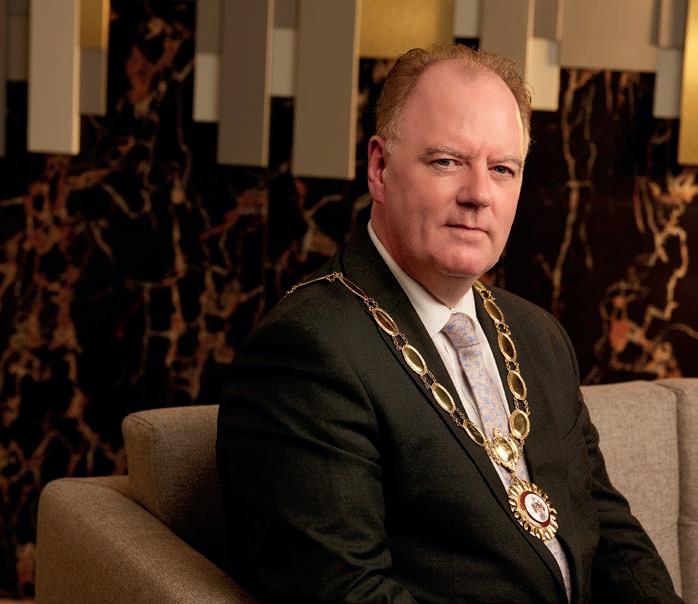
Over the last 20 years Brian has been involved in legal education as a Teaching Assistant at the Institute of Professional Legal Studies (IPLS) and has been a Law Society Council Member for over 10 years chairing several committees.
Outside his legal practice Brian has been involved in several charities including the sexual abuse counselling service Nexus for which he was appointed Chair of their Board of Directors from 2016 -2018.
Brian is presently a trustee of the charity Include Youth.
President’s Q&A
You begin your Presidency at a time of uncertainty - what do you see as the main challenges which lie ahead?
Undoubtedly, we are living in unprecedented times with significant pressures on the economy and growing uncertainty about public spending cuts.
As President and as a sole practitioner I experience these pressures on a day-to-day basis with regard to my own office. I am a sole trader and I face the same difficulties in my business as the vast majority of the 52% of the solicitor’s profession who are also sole traders or sole principals. It is a difficult economic climate for any business. However, with respect to Legal Aid practices we are in the unenviable position that while the source of our work is the general public, the payment of same is from the government. We are dependent on public funds administered by the Legal Services Agency. Solicitors have no control when our fees are to be paid by the LSA and over the last 3 years the time lag for processing payments in standard fee cases has increased from 6 to 12 weeks. This issue causes great difficulty in maintaining a cash flow sufficient to keep our offices running. In the vast majority of cases the profile of Legal Aid work involves fixed fees in the Magistrates, Crown Court and the Family Care Centre. There is no justification why it should take on average 12 weeks to pay these fees. In every other sphere of business the government aims to pay its service providers for completed work within 30 days.
I recently had a discussion with a Scottish Legal Aid Solicitor who advised me that once he submits a report on case to the Scottish Legal Aid Board he can expect payment within 7 to 10 days. Why can our Legal Services Agency not meet similar targets? We are simply asking that we are paid in a timely fashion consistent with business norms.
All firms face their own challenges with the increased cost of living. It is apparent competition within the legal commercial sector has risen sharply over the last 5 years. Northern Ireland now has more international law firms than anywhere else in the UK, second only to London. This has driven the salaries for newly qualified solicitors in these firms to starting at £40k.This in itself has widened the divide between commercial and Legal Aid law firms. General Practice offices are suffering a crisis of recruitment, retention, and succession planning. Many young solicitors do not want to work outside Belfast and are avoiding the traditional high street practice which deals with domestic conveyancing, criminal Legal Aid and personal injury cases. Unless this trend is changed in the medium term we will lose the network of small practices which provide an essential one stop legal service throughout our jurisdiction.
4 Ezine of the LSNI Winter 2022/Spring 2023
There is no simple solution to these problems in the short term but with the assistance of the Society’s Member Services Department solicitors in the future will be able to access advice on sharing back office support in local areas. The Society will encourage firms to diversify their clientele where possible. More offices will have to consider merging to remain economically viable. We cannot afford as a profession to remain complacent - once the general solicitor practitioner is gone there will be no provision of legal services for the most vulnerable in our community. Legal Aid solicitors are at the coalface of welfare services and without them access to justice will only be available to those who have the means to pay.
The Society has just marked its Centenary Year but what do you see as the priorities moving forward into the next century?
I believe our priorities have been defined by the recent Hook Tanganza report and Diversity and Equality Survey which have signposted those areas of importance for the Society including women within the profession, supporting sole practitioners, embracing technology and building and championing equality and diversity across the profession. These reports provided the Society with a detailed profile of the profession and its economic contribution to the NI economy.
Our profession has radically changed over the last 15 years. I attended the newly qualified solicitors Admission Ceremony on 24 February and it was obvious that the profession has undergone dramatic change. Of the 85 solicitors who attended the event 70% were women and approximately 80% were taking up positions in exclusively commercial practices.
However, it is the case that within 5 years the vast majority of women solicitors will have decided to leave private practice. While a high portion of women solicitors are leaving to join the public sector, a sizeable body of practitioners are leaving the practice of law altogether. Our profession as a consequence loses a valuable source of talent.
If we are to reflect the community we serve, then it is imperative we look to introduce reforms into our offices which will encourage young women to remain in private practice. The Society intends to lead and promote a discussion with the profession to look for solutions to this problem. Part of this strategy
to engage with the Membership will build upon the excellent work carried out by my predecessors Brigid Napier and Rowan White during their presidential terms. Throughout April and May of this year I with the Member Services Department of the Society will be visiting local solicitor associations to listen to their concerns and explain how the Society via its Management Team and Council will respond in the coming months.
As a representative body we need to build on our engagement and understand the needs of our Membership and other key stakeholders.
The Society now has in place the structures to undertake this work. It must be the voice of all solicitors and provide value for money to our Members in the roles of regulation, representation, legal education and continued professional training.
As a criminal law solicitor are you concerned about the future of access to justice and Legal Aid funding?
There have been significant pressures on the Justice and Legal Aid budgets even before the pandemic and downturn in the economy which have been the cause of concerns. It was for this reason that the Society at the beginning of last year commenced a series of engagements with the main political parties. This has resulted in the narrative moving from an attack on lawyers’ fees to a realisation by the DoJ and wider political representatives that solicitors via the provision of Legal Aid provide an essential welfare service which ensures access to justice for the most deprived and vulnerable in our community.
The Legal Aid budget which stood at £75 million in April 2022 was after a Direction by the Justice Minister Naomi Long MLA in October 2022 increased to £95 million. It should be noted that following further lobbying by the Society it is anticipated that the Legal Aid budget for the next financial year will remain at a base figure of £95 million. However, it will undoubtedly be subject to further pressure from the Treasury in the event that the Executive remains suspended and control of public spending is subject to the decisions of the Secretary of State.
Any spending cuts are yet to be announced but the impact that they would have would be significant especially if there are cuts to the justice and Legal Aid budgets.
I can assure Members that during my Presidency the Society will continue to argue for a sufficiently funded justice and Legal Aid system.
The bottom line is that you cannot provide justice on a shoestring and expect the solicitor profession to work more for less.
You cannot deliver access to justice by devaluing the network of solicitors and the essential work that they provide.
You cannot abandon the most vulnerable within our community who must have access to the network of solicitors and justice.
You have spoken of your desire to engage with Members in a more meaningful way. How do you hope to achieve this?
One of my main priorities is to engage proactively with Members. I am all too aware of the pressures faced by general practitioners in Belfast where I practise, but I want to know the concerns of solicitors across NI. However, I want to stress that as your President my door is always open. If a solicitor, whether a principal or an assistant solicitor, has an issue which they wish to discuss I can be contacted at Law Society House or via my own office.
I also want to find new ways to interact with Members so that the Society can understand the pressures and challenges affecting Members in-house, in the public sector and in private practice. This work is already underway through the Member Services and Policy Departments at the Society. The Society is presently looking at improving our website to make it more relevant for Members and the public in respect of the information it provides and at a more comprehensive training tool in the provision of CPD.
How important will the issue of equality and diversity be during your Presidency?
I believe that last year’s Diversity and Equality survey and the Hook Tangaza report have provided the Society with the necessary action points to inform our work programmes moving forward.
This work is timely in terms of the pressures facing the solicitor profession but also there is a recognition that if we are to meet the challenges and opportunities of the next decade then the Law Society must embrace
Ezine of the LSNI 5 Winter 2022/Spring 2023
equality and diversity issues. To this end I have promoted within the Society the Centenary Bursary Scheme which will be launched later this year. There is a need for the composition of our profession to reflect the wider community. Admission to the legal profession should be based on a person’s ability not their means to pay. I will be commencing a programme of secondary school visits later this year to encourage students from this sector to consider a career as a solicitor.
The Diversity and Equality Report illustrates that too few women solicitors reach partnership positions in private practice whereas in the public sector women are predominant. If we are to provide a warm house for women lawyers in private practice then offices must have policies in place which promote flexible working hours and home working. Women solicitors should feel supported when going on and returning from maternity leave. Every practice should have a policy which is acted upon in respect of women employees who are experiencing the menopause. The greatest asset any organisation has regardless of its size is its staff and if they are not valued then that organization will suffer decline as a direct consequence.
Do you think there is a role for the Law Society of Northern Ireland moving forward?
Very much so and particularly in light of the pressures facing Members.
The Society in my view remains best placed to not only regulate but to also represent its Members.
In the current climate there is a greater need for the network of solicitors to be protected and their voice to be heard by decision makers and wider stakeholders within our community. The Society has shown by its campaign of political engagement that it is relevant. The political narrative as a direct result thereof has changed from concentrating on Legal Aid fees to the issue of access to justice and whether a client is represented before a criminal, family or civil court.
The Society has refurbished the second floor of Law Society House with the creation of The Meeting Space and in conjunction with the refit of the Law Club on the fourth floor
practices outside of Belfast should regard Law Society House as their Belfast base. Future plans are being developed to transform the Library on the fourth floor to a Knowledge Hub which will provide Members with the latest legal research platforms.
Has technology outstripped the need for a solicitor?
Certainly not! No computer or AI system will ever be able to provide the empathy, understanding, concern and commitment provided by our Members in support of their clients. Technology is a business tool which should assist solicitors in providing legal services to their clients across all areas of law but the life experience and judgement of a solicitor cannot be duplicated and replaced by a computer programme.
I strongly believe that being a solicitor is a vocation - a commitment to our community and an unseen part of the welfare state.
Every client regardless of the problem or challenges they are facing requires a human interaction to give them the assurance that someone is helping them. The law allows an individual to seek and obtain justice. However,it is a solicitor who leads and prepares a client for their court case to obtain justice for example by way of compensation for a personal injury or by the representation of a child in a family care case by a NIGALA Panel Solicitor.
I am proud that our Members continue to do this day in and day out.
Your charity of the year is Include Youth, why did you choose them?
I’ve been involved with Include Youth as a Trustee for many years and I have seen first hand the fantastic work they provide in supporting young people from disadvantaged communities.
Their vision of realising the rights and potential of all children and young people is something about which I am very passionate.
I am delighted that they are our charity of the year and that we will have the opportunity to support them in raising the profile of the work they do as well as raising much needed funds for their projects.
I do hope that colleagues will get involved
and support them by getting involved in the Legal Run/Walk taking place on 12 May and other events the Society plans throughout the rest of the year.
What made you want to become a lawyer?
I was brought up in West Belfast in the 1970s and early 80s. I went to De La Salle Boys Secondary school and that very much shaped and defined who I am today. However, I was not alone and all of my school friends, who are still friends today, have done exceptionally well in a variety of fields across many professions.
But I would attribute any success to the belief that was instilled in me from primary school that education is an easy burden to carry. This is why I went back to University in 2007 and completed a Masters in Law on Human Rights and Criminal Justice. I also benefited from the advice and direction given to me in my teenage years from an excellent lawyer and civil rights campaigner Madge Davidson BL. Madge was a part time tutor in the then Law Faculty at Queens University. She mentored and encouraged me to apply for law when I was considering my University application.
From an early age I always had an interest in law, and I continue to be passionate about it to this day.
How can Members get involved in supporting your Presidency?
I would like Members to come along to the Local Association Roadshow events the details of which will be released soon and to engage with us on those issues of importance to them.
As a sole practitioner I’m all too aware of many of the issues and challenges which Members face but I’m open to hearing from all Members regardless of whether they are in private practice, the public sector or in-house as I value their input also. I may not be able to offer solutions but I can guarantee I will listen.
I would be delighted if Members get involved in charity events which will be coming up and to use the new facilities at Law Society House.
6 Ezine of the LSNI Winter 2022/Spring 2023
The Presidential and Chief Executive Team of the Law Society of Northern Ireland.

Senior Vice-President Brigid Napier
Brigid Napier graduated from Queen’s University Belfast in 1985 and joined her father in the family practice of Napier & Sons, a firm established by her grandfather in 1930. Since its inception, the firm has been renowned for its expertise in insolvency and Brigid proudly accepted this mantle, becoming one of only three solicitors in the jurisdiction to be licensed as an insolvency practitioner.
She is currently a Director in Napier Solicitors and advises on all aspects of personal and corporate insolvency and is regularly appointed as a trustee in bankruptcy or liquidator in complex insolvencies.
As a practising solicitor with over 30 years’ experience her daily work involves working at the coalface with individuals and businesses in crisis.
She was elected to the Council of the Law Society of Northern Ireland in 2017 and has since served as a member of several regulatory committees, including the Professional Conduct Committee, and as Chair of the Professional Liability Committee.
She was President during the Society’s Centenary celebrations which took place in 2022 and has been instrumental in promoting diversity and inclusion within the legal profession.

Junior Vice-President Darren Toombs
Darren Toombs grew up in Warrenpoint, was educated at Abbey CBS in Newry and graduated with an Honour’s degree in law and accountancy from Queen’s University Belfast in 1998.
He accepted an apprenticeship with MacElhatton & Company Solicitors in Belfast, graduated from the IPLS in 2000, and was admitted to the Roll that same year.
In 2003, Darren moved to the Litigation Department within Carson McDowell Solicitors where, for the next 15 years, he headed up the Debt Recovery Team and the firm’s Departmental Enforcement Team for bodies such as The Planning Service, The Roads Service and Translink.
Following the opening of an opportunity within the firm, he moved to working within the insolvency sphere, quickly gaining a sound reputation litigating for trustees, administrators and liquidators. On that insolvency litigation foundation, he has built a full insolvency and restructuring team within the firm over the past seven years.
Darren was co-opted onto the Education Committee of Law Society of Northern Ireland in 2006.
In 2015 he was elected to the Council of the Law Society of Northern Ireland and has served as a member on a range of Council Committees. He is currently a member of the Society’s Business Committee, the Professional Conduct Committee, the Contentious Business Committee, the Future of the Profession Committee and the Education Committee of which he is Chair. He also serves as a nominee of the Society on the Council of Legal Education.

Ezine of the LSNI 7 Winter 2022/Spring 2023
From left: David A. Lavery CB, Chief Executive; Brigid Napier, Senior Vice-President; Brian Archer, President; Darrren Toombs, Junior Vice-President.
Council of the Law Society of Northern Ireland
Following a successful online election in November 2022, the membership of the Council for the three year term to November 2025 is now as follows:
Council Members - Ordinary Representatives
Council Member Firm/Organisation
Archer, Brian Archer Solicitors President
Bell, Jennifer Crown Solicitor’s Office
Butler, Louise DAC Beachcroft
Ewing, Eileen Thompson Crooks
Guerin, John Clyde & Co
Keown, Lorraine Cleaver Fulton Rankin
Kinney, Christopher Murphy O’Rawe
Mairs, Andrew Keenan Solicitors Ltd
McKenna, Eoghan McKenna Sweeney McKeown
McVeigh, Joseph KRW Law
Mitchell, Colin McCartan Turkington Breen
Napier, Brigid Napier & Sons Solicitors Ltd Senior Vice-President
Nixon, Catherine Departmental Solicitor’s Office
Nugent, William Thompson Crooks
Robinson, Michael CMG Cunningham Dickey
Speers, Brian CMG Cunningham Dickey Treasurer
Spence, Janice Donaldson McConnell
Toombs, Darren Carson McDowell Junior Vice-President
Walker, Brian Walker McDonald
White, Rowan Arthur Cox (NI)
Wilson, Sarah Departmental Solicitor’s Office
Council Members - Constituency Representatives
Southern Constituency
Charity, Brian Gibson Solicitors LLP
Ferguson, Andrew Fisher Mullan Solicitors
McCaffrey, Julie-Ann Greentown Environmental Ltd
Northern Constituency
Armstrong, Philip Armstrong Solicitors (NI) Ltd
Borland, Mark Conway Todd & Co
Cherry, Karen Samuel Cumming & Son
Eastern Constituency
Chambers, Simon Russell & Co
O’Prey, John Murlands
Thompson, Shauna Mildred Breakey Solicitors
8 Ezine of the LSNI Winter 2022/Spring 2023
The Right Honourable Dame Siobhan Keegan, Lady Chief Justice of Northern Ireland

The President, Brian Archer, has kindly invited me to contribute an article to this edition of The Writ outlining my priorities for the coming year.
Many of you may have heard or read my Opening of Term address in September 2022 in which I addressed my three key priorities: avoidable delay; problem solving justice; and modernisation. In this article I focus on the first of these and particularly the impact of delay on victims and witnesses within the justice system.
Victims of crime find themselves in our courts not of their own volition but because they are required to be there; they can occasionally be unwilling participants but have found themselves in a situation where their contribution is key to the justice process. That pressure, added to what may already have been a traumatic experience, can be immensely overwhelming and delays in the criminal justice process often exacerbate that trauma, adversely affecting the quality of their evidence.
Supporting victims of crime to give the best evidence they can, when required to do so, is the foundation of modern justice; they are first and foremost witnesses to the events in question and play a crucial part in the criminal justice process. It is their evidence, and the testing of their evidence, that will contribute to the just outcome in any criminal matter.
Victims themselves fall into many nuanced categories and it would be wrong to assume that every victim requires the same level of support when providing their evidence either during an investigation or at a court hearing. However, many victims will be required to relive, on multiple occasions, events that they would rather push to the very far recesses of their mind.
Our voluntary organisations do an exemplary job of providing tailored support to a significant number of victims and witnesses every day in our criminal courts to ensure the best evidence can be given. The needs of the individual victim will be foremost in their minds, and they are skilled and trained in providing support to address those needs.
There are however many other forms of support and protection that could be afforded to victims and much that can still be done to accomplish the best outcomes for them and the justice process. Sir John Gillen’s Report into the law and procedures in serious sexual offences provided a clear pathway for reform across the breadth of engagement in those types of cases.
Those reforms would also benefit victims of other types of crime if they became embedded in our processes. I don’t, however, underestimate the challenge to take reforms of this scope forward in what is an increasingly challenging budgetary landscape. Although there has been some recent and welcome progress in providing additional support and protection measures for victims, there is still more that can and needs to be done.
Remote Evidence Centres afford a victim space and detachment from our busy court buildings and protect them from the potential of coming face to face with those who have
caused them pain or anguish. I would like to see the use of these supported and extended so that vulnerable and intimidated witnesses are not further traumatised by attending court buildings to give their evidence.
Specialist support, in the form of SOLAs (Sexual Offences Legal Advisers), are a relatively new initiative established to offer legal advice and support to adult victims of a serious sexual offence. SOLAs are providing a level of assurance to victims that their rights are protected and their voice can be heard not only when they are giving evidence in a courtroom but during all aspects of the criminal proceedings. Again, I would like to see this service extended to other types of serious crime where there is a need for a victim’s voice to be heard and their rights protected.
All of these initiatives are welcome and support the ethos of Practice Direction 2/2019 which sets out clearly the obligations for those involved in Crown Court proceedings. I would like to draw attention to the requirements set out in the Practice Direction and remind all practitioners that they set the standard of engagement expected in these matters.
While it is essential that the evidence before a court is tested to ensure that justice is delivered, and fair trial rights protected, the environment must not damage further those that have, often through no fault of their own, become involved in a crime as either a victim or witness.
It is easy for those of us who come through the doors of our court and tribunal buildings on a daily basis to overlook the fact that, for many, crossing that threshold is often a formidable and stressful experience.
While striving to deliver justice whether as Judge, prosecutor or representing defendants, an awareness of the impact the criminal justice process can have on those it affects must form the cornerstone of practices and procedures to ensure that the best outcome prevails. It is one of my priorities to promote this approach in liaison with the legal profession, and all others who are engaged in this area.
PRIORITIES
Ezine of the LSNI 9 Winter 2022/Spring 2023
Alison Grundle, Head of Member Services
2022 was a momentous year for the Law Society, one in which we celebrated our Centenary – fully!
2023 now sees us looking forward to the next 100 years and to the challenges and opportunities that lie ahead of us.
The Hook Tangaza report, commissioned by the Society in 2022, examined the solicitor profession in Northern Ireland - a profession that directly employs 6,000 people and contributes almost half a billion pounds to the local economy every year. This report,
Laura McCullough, Head of Professional Conduct Department

The primary purpose of the Professional Conduct Department is to maintain high standards of professional conduct within the solicitor profession in Northern Ireland, and, in doing so, protect the public and uphold the reputation of the profession.
The Society is committed to ensuring that its model of regulation is responsive to the modern context of legal practice and is informed by best practice. For this
and the Diversity and Inclusivity survey also commissioned by the Society in 2022, lays the groundwork for where the Member Services department will focus our attention this year.
Last year’s President, Brigid Napier, took ‘Members First’ as her theme and we will continue to build on the work that Brigid started. Our current President, Brian Archer, will undertake his tour of the Local Associations over the next quarter. He will be eager to hear the thoughts and concerns of Members and see how the Society can deepen its relationship with Members through continuing to build better engagement and also by working more closely with Members in their local areas.
A new (long overdue!) website will be delivered this year and alongside it a Membership Platform that will offer a significantly improved Member experience. The new platform will offer greater functionality and better personalisation, making it faster and easier for Members to find information based on their individual interests and area of practice.
We will also continue our ‘digital first’ approach by bringing more services online. Elsewhere in this issue you can read about the National Wills Register, a new digital service for Members to avail of, provided by commercial partners.
The Society has spent considerable time and effort raising awareness of the risks of becoming a victim of cybercrime. As a result, our Members are highly vigilant and well informed. However, as awareness rises, the tactics of cybercriminals adapt and are becoming increasingly sophisticated and creative. Northern Ireland is a global leader in cybersecurity, and we are lucky to have access to world leading firms who are working with us to develop a security solution for our Members. We recognise that the limited resources of smaller firms and sole practitioners can make them more vulnerable. Therefore, the service that is being developed will offer protection and detection services to firms of all sizes.
Last year we opened the Law Club which is proving to be a really popular meeting and working space for Members – if you haven’t visited yet, please call in the next time you are in the Legal Quarter.
reason, this year commences an ongoing commitment by the Society to reflect on the processes and procedures in place which have served the Society well over the past 100 years and to evolve in line with the changing landscape of professional regulation. All modern regulators have a duty to consider and review their model of regulation to ensure that the regulations governing the profession are proportionate and risk- based. This will be the primary focus of the Professional Conduct Department not only this year but into the future. Underpinning all of this will be engagement and partnership working with Members.
Alongside this commitment, the Professional Conduct Department will continue to manage the Society’s work in a number of key regulatory fields: client complaints, professional conduct complaints and investigations, monitoring and inspections, anti-money laundering/risk assessment, Compensation Fund applications, referrals to the Solicitors’ Disciplinary Tribunal and interventions under the Solicitors Order.
The Department will also continue to support the Client Complaints Committee and Professional Conduct Committee as well as managing the Remuneration Panel process. There are several tailored CPD training programmes supported by the Department this coming year. Many focus on key themes and trends arising out of the Department’s case work and aim to support Members in their daily practice. Details of these can be found in the Society’s online CPD Prospectus.
The Department remains subject to external inspection and audit by:
• The Legal Services Oversight Commissioner (LSOC), Marian Cree, who is responsible for overseeing the complaints handling system in place for the solicitor profession.
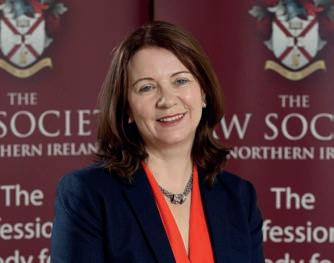
• The Office for Professional Body AML Supervision (OPBAS), who monitor the Society’s anti-money laundering work.
The Insolvency Service Northern Ireland, who monitor the Department’s supervision work relating to insolvency practitioners.
10 Ezine of the LSNI Winter 2022/Spring 2023
Policy & Engagement Department 2023 Priorities
Jamie Warnock, Head of Policy & Engagement Department

Political engagement and justice reform
As the arm of the Society tasked with engaging our elected representatives and political parties, I feel I cannot discuss our Department’s priorities without first referencing the current Stormont stalemate. As I write this piece, we have just passed the first anniversary of the collapse of the Northern Ireland Executive. I sincerely hope there is not a second anniversary as I believe it is in the best interests of the solicitor profession, the justice system and the public in general that we have devolved government working again in Northern Ireland as soon as possible. Clearly, the restoration of the Assembly and the Executive would have an impact on the work of the Department. Last year we worked hard with Ministers and MLAs to change the narrative on Access to Justice, helping to secure increased funding to the Legal Aid budget in 2022-23. Although investment into the system is undoubtedly needed, we need more than short-term fixes - with the Justice Agenda last year we advocated for an ambitious programme of structural reform and improvement of NI’s justice system. We will continue to do that in 2023 and plan to publish a refreshed Justice Agenda later this year, building on 2022’s success and plotting the medium-term roadmap to successful justice reform in the jurisdiction.
Future of the Profession
The Future of the Profession Committee has a broader mandate than many of our Policy Committees, having been set up to consider strategic issues that cut across the profession. In addition to the Committee’s two Working Groups - Climate Justice and Law Tech - the Committee will be turning its focus this year to the opportunities and challenges presented by the Hook Tangaza research carried out last year. A key issue will be the growing differential between large, corporate firms in Belfast and small, rural and/or general practices and consideration will be given to supporting innovation across the sector.
NI Conveyancing week
Conveyancing remains one of the most important areas of solicitors’ business in NI. However, despite conveyancing being one of the most likely and frequent ways members of the public will engage with the profession, the role of the solicitor is often not well understood by their clients or others involved in the conveyancing process. We aim to start addressing that issue with the first NI Conveyancing Week - led by the Conveyancing and Property Committee - later this year, which will aim to raise the profile of and educate the wider public about the vital role of the conveyancing solicitor.
Sustainability strategy
Another piece of work I look forward to progressing this year is the Society’s Sustainability Strategy. This is being led by the Climate Justice Group and will build on the Society’s Resolution on Climate Change. The Strategy will contain actions which will make the Law Society more climate conscious in our day-to-day activities - for instance, by reducing our environmental impact - and actions that focus on providing support and guidance to our Members on climate matters.
Ezine of the LSNI 11 Winter 2022/Spring 2023
%
Darren Patterson, Head of Professional Development
Introduction
The solicitor profession in Northern Ireland currently faces significant challenges, including the growing competition for talent, increasing client demands, technological innovations and broader policy developments. These factors have already altered the way in which many forwardthinking firms operate and prepare their business for change.
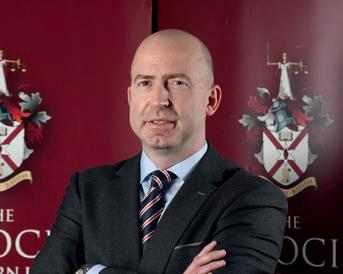
A key priority for many firms in this regard is how to attract and retain talent to manage succession. For any business that has gone to the market in recent years yet has been unable to find affordable candidates who possess the required capabilities, it may be time to look again at the benefits that can be realised by taking on a trainee solicitor.
Organisations who have a successful track record of employing and developing trainees find that they significantly contribute to the development of their business and organisational outcomes. Those recruiting within such training firms understand this contribution is often proportionate to the support that trainees receive during their training period from more experienced solicitors in the organisation, particularly those in the role of Master. These practitioners can bring real value to a trainee’s development, imparting their knowledge of the profession, its governance and ethical standards.
Furthermore, they also afford the trainees appropriate opportunities to enhance their legal skills and knowledge through real world experience and provide practical day-to-day leadership and supervision of their work, ensuring trainees remain motivated and committed as they grow.
Grow Your Own –The Key Benefits of Trainee Solicitors to Your Firm
This article explores the advantages of recruiting and managing trainee solicitors as part of a firm’s resource mix within their workforce.
The Trainee Solicitor Programme
Qualifying as a solicitor requires a twoyear period of traineeship that involves a combination of formal academic instruction at the Institute of Professional Legal Studies and practical in-office training under the supervision of a Master.
Alongside academic excellence and enthusiasm for building a career in law, trainees will provide many benefits to a firm that understands the value of nurturing talent and allowing people to grow as their career progresses. The Law Society of Northern Ireland has recently engaged with a number of Member firms to better understand these benefits in practice. One partner from a busy Belfast city centre practice specialising in property and commercial matters explained how taking on a trainee has been a very worthwhile exercise which greatly benefited her business.
“Trainees are a key part of our strategy for growth and sustainability so that we can continue to meet the needs of our clients moving forward. Investing in new talent has been crucial to our longevity and to succession planning”.
Other benefits cited include how trainees bring fresh energy and enthusiasm to a firm.
Trainees, from an early stage, can prove to be a valuable resource in terms of helping with legal research and administrative or procedural tasks. This not only saves other colleagues time but allows the trainee to gain hands-on experience of the work of the firm.
Additionally, taking on a trainee is a fantastic opportunity to foster new talent and by helping a trainee to develop from the outset of their legal career, an organisation may invariably save on recruitment and training costs in the long-term.
Furthermore, the appointment of a trainee is relatively low-risk, and the fixed-term nature of the training contract gives firms both certainty and security in terms of its financial commitments.

Why take on a trainee solicitor?
Taking on a trainee solicitor has several benefits. It is an excellent way to create a pipeline of new talent that is affordable, intelligent, committed, and loyal. It also has the advantage of putting something back into the solicitor profession in Northern Ireland.
Are you looking to appoint a trainee solicitor?
For more information contact the Professional Development team at the Law Society of Northern Ireland via registration@lawsoc-ni.org.
12 Ezine of the LSNI Winter 2022/Spring 2023
Professional Development Priorities 2023
Over the past year the Society has been working hard to enrich our evidence base so that we can better support and represent our Members, as we look to build for the next 100 years. This involved commissioning our first ever Equality and Diversity survey - which took a closer look at the people who make up the solicitor profession in Northern Irelandand a study on the legal services economy.
Both of these studies have highlighted numerous challenges and opportunities relating to the vocational education and training of solicitors in Northern Ireland, which will form a key area of focus for the Society’s Professional Development team over the next three years. A clear priority that has emerged from our work within this space is the need to break down barriers to accessing the profession for those with the capability but not the means to gain entry.
An important initiative in this regard will be to boost our outreach and engagement activity, so as to build better awareness of the solicitor profession as a desirable career choice that is open to all. This will involve targeting young people from diverse backgrounds and developing new work experience programmes within local
IN MEMORIAM
schools and universities. Additionally, the recent relaunch of the Law Society’s Member-to-Member mentoring scheme will seek to champion role models and mentors within the profession from a diverse range of backgrounds and experiences.
To alleviate the impact of financial barriers to entering the profession, the Society will introduce a bursary scheme as a legacy project from its centenary celebrations. The access scheme is designed to address financial impediments to entering the profession for those from under-represented groups and will cover the costs of the participant’s fees to attend the Institute of Professional Legal Studies. The Society will also explore the potential for traineeship grants and funding for small provincial and rural practices in 2023.
Our work will be guided by research, insight, and data to inform all our activities. In spring 2023 a survey of all trainee solicitors and recently qualified solicitors over the past five years will be administered to generate empirical evidence on the vocational training experience. Insight garnered from this exercise and other research will be used to develop more detailed plans on how we will deliver future legal education and training activities in the years ahead as we work to deliver a pipeline of solicitor talent that will meet the future workforce needs of the profession.
We remember those colleagues who passed away within the last number of months and we extend to their families our sincere condolences.
Paul Connolly, solicitor, on 16th December 2022.
Paul was admitted to the Roll in 1981 and set up as a sole practitioner in Paul Connolly Solicitors, Portadown in 1994 before retiring in 2010.
Patrick Diamond, solicitor, on 19th December 2022.
Patrick was admitted to the Roll in 1988 and was a solicitor in Patrick Diamond & Co before retiring in 2009.
W Laurence Mahood, solicitor, on 18th December 2022. Laurence was admitted to the Roll in July 1978, and was a partner in the firm of Elliott Duffy Garrett before retiring in July 2013.
Margaret Caher (née Graham), retired solicitor, on 28th December 2022. Margaret was admitted to the Roll in May 1978, and was an Assistant Director in the Departmental Solicitor’s Office before retiring in 1999.
James Wilson Russell, solicitor, on 13th January 2023. James was born on 18th November 1922 and had recently celebrated his 100th birthday. He was known to many as Jay and had qualified as a solicitor in 1944 with a FirstClass Honours degree, serving his apprenticeship with TG Mackintosh of Newtownards.
Joseph Anthony (Joe) McGarrity, solicitor, on 9th February 2023.
Joe was admitted to the Roll in May 1996 and served previously as a solicitor in John McGale, Kelly & Co Solicitors in Omagh.
Herbert L (Herbie) McCracken, solicitor, on 13th February 2023. Herbert or Herbie as he was known was admitted to the Roll on 1 January 1952 and retired in December 2004. He was a former principal in Johnsons Solicitors. He passed away at the age of 95.
Colette Diamond, solicitor, on 19th February 2023.
Colette was admitted to the Roll in 1982. She previously worked for the firm of Francis Keenan.
Thomas Boyd Girvan, solicitor, on 26th February 2023.
Thomas was admitted to the Roll on1st September 1952.
William (Bill) Oliver, solicitor, on 25th February 2023. Bill was admitted to the Roll in1977.
Ezine of the LSNI 13 Winter 2022/Spring 2023
The Departmental Solicitor’s Office Apprenticeship Competition
Introduction to the schemes
The Departmental Solicitor’s Office (DSO) annually runs an apprenticeship competition within both its Civil Litigation and Advisory divisions. For the first time in 2021, the DSO took part in the Northern Ireland Civil Service (NICS) student placement scheme.
The DSO Apprenticeship Scheme offers graduates an exciting opportunity to secure a two-year traineeship with the Institute of Professional Legal Studies (IPLS). Outside of IPLS, trainees are given the opportunity to work alongside a team of lawyers covering a broad spectrum of work, creating endless opportunities for career development and training.
We asked some recent successful candidates about the current schemes, and this is what they had to say:
ÉADAOIN MacRANDAL –DSO Litigation Apprentice, qualified September 2022


After graduating with a law degree from Durham University, I came back home to Belfast and completed a Master’s degree at Queen’s University in Business Management. Despite studying in England, I have always been keen to train as a solicitor in Belfast, and so applied to the Institute of Professional Legal Studies. I was delighted to be accepted for a training contract with DSO and began my training in October 2020.
Unlike some private firms, my time with DSO was not divided into training ‘seats.’ This ensured flexibility and diversity in my
GEMMA ROSS –DSO student placement, currently in final year in QUB
I am a final year undergraduate student at Queen’s University Belfast studying a Law with Politics LL.B degree. In summer 2021, after completing my second year of university, I decided to apply for the Civil Service 51-week placement scheme - and what a great decision it was. I spent a year working within DSO in their litigation division and my experience was invaluable.
The length and breadth of casework that DSO deals with is vast and this helped me to develop key transferable skills which will support me in my forthcoming career. I have attended the Magistrates Court, County Court, High Court and Court of Appeal, all of which afforded me an invaluable insight into the intricate running of the world of law.
training to match the diverse workload within DSO. I could follow cases from beginning to end and jump into different practice areas as new matters arose. I was exposed to a huge variety of legal issues relating to employment, education, health, inquests, personal injury and policy.
I benefited from a very varied workload, attending Employment Tribunals, mediations, consultations and preparing hearing bundles for and attending Court of Appeal cases. On a daily basis, DSO deals with high pressure and political legal problems. I was always allowed to get involved, assisting with headline judicial reviews and time-sensitive constitutional matters.
I benefited from the advice and experience of a huge litigation team; there was always someone to touch base with. Everybody I encountered
No day in the office was the same as the division deals with cases ranging from personal injury, judicial reviews, Court of Appeal Cases and employment to much more. This wide range allowed me to get a sense of different legal disciplines and in turn appreciate the work of each. Moreover, the range afforded me a great opportunity to see the topics that I have studied in university in action and apply my knowledge to live cases. Not only did I attend court, but under the supervision of my line manager I engaged in vital discussions with counsel and clients and dealt with external legal representatives to ensure the smooth running of cases. This most certainly helped me develop vital interpersonal skills like effective communication, whether that be verbal, written or the subtle art of listening; emotional intelligence (due to the sensitive nature of some cases), and effective problem-solving.
My time in DSO allowed me to develop not only important legal skills but also skills that are paramount for the politics element of my degree. I also got the opportunity to work
was more than willing to take the time to teach me, challenge me or just chat about life in law.
I loved getting into the office to catch up with our placement students and other trainees, as well as getting involved with wider NICS events such as International Women’s Day, the Harkin Summit and NICS legal conferences. My master also organised for me to spend some time in a private firm and the Attorney General’s Office.
I am very aware that DSO gave me a unique training experience which I could not have got anywhere else. I definitely feel that it has equipped me with skills, experience and an interest in law which will serve me well in my future career. I was admitted to the Roll of solicitors at the end of last year and have successfully secured a job as a newly qualified solicitor.
in Department for Communities Strategic Employment Division. I worked as part of a team dedicated to delivering the Harkin Summit. Due to the fast-paced nature of the division I effectively developed the vital skills of timekeeping and adaptability. I also received an insight into the intrinsic and important link between social issues, social policy, and the law.
It can seem like a big jump going from university to full-time legal employment, and it was. But the wealth of knowledge shared by all litigators in the Department reassured me that I was in safe hands. No question was ever too big or too small in DSO. Taking part in the placement really made me excited to take the next step in my career and it has helped me with my university studies. I would urge anyone who is thinking about it to take the leap and apply.
More information on the placement scheme and the application process can be found on the NICS recruitment website.
14 Ezine of the LSNI Winter 2022/Spring 2023
Noel Kelly, President OITFET

Judicial Mediation Scheme
A New Approach in Employment Tribunals
If you were given a blank piece of paper and were asked to design a scheme to resolve a range of employment-based disputes, with minimum cost and minimum formality, it is unlikely that you would suggest a formal system of litigation based upon the county court which involved an interlocutory procedure with discovery and interrogatories, protracted case management hearings, formal contested hearings and, ultimately, lengthy written judgments with an appeal to the Court of Appeal. Given the general move towards alternative dispute resolution, the future for employment Tribunals must involve the consideration of, firstly, early conciliation with the assistance of the Labour Relations Agency; secondly, judicial assessment and/or judicial mediation; and thirdly, and only where necessary, formal litigation.
There are currently well over 200,000 claims awaiting determination in the NI tribunals. Many of these are repeat claims arising out of the Agnew1 or the McCloud2 litigation. Following the anticipated Supreme Court judgment in Agnew and the introduction of legislation post McCloud, many of these cases will be settled or will be resolved in a series of Remedy Hearings. A more realistic way of assessing workload is to discount the multiples and to look at the hard core of claimants (rather than individual claims) who each require a hearing. In October 2022 there were 1,073 such claimants and therefore 1,073 hearings in the queue. Due to a combination of strict case management and listing that number has reduced to 972 in February 2023. While there has therefore been a significant throughput of cases in recent months due to the combined efforts of the Tribunal Judiciary and the Tribunal secretariat, there is still a significant workload. Six hearings are listed daily in each of the six tribunal rooms as well as a large number of Case Management Preliminary Hearings. Counting myself and the Vice President, there are eight full-time Employment Judges. Allowing for the additional impact of leave, case management, administrative work and judgment writing, there is real pressure in the Tribunal system. To reduce that pressure, there has to be more emphasis on alternative dispute resolution.
To that end, a new system of judicial mediation (JM) and a new system of judicial assessment (JA) will start in April 2023 in employment Tribunals in Northern Ireland.
Judicial Mediation
When considering whether to advise clients to use JM, parties and representatives should note the following:
(i) JM will be free to parties. The Tribunal will not levy a charge. In contrast, private mediation can be expensive for most employment based disputes.
(ii) The mediator will be an experienced Employment Judge who has been trained in mediation, specifically in relation to employment-based disputes.
(iii) Both parties have to agree to JM. It will not be compulsory and parties, even if they initially agree to JM, can pull out of the process at any stage.
(iv) If a mediated solution is agreed in JM, an LRA duty officer will be available to complete a TM1 (conciliation).
(v) A mediated solution can include remedies which are not available under statute to a Tribunal, e.g., an apology, a reference, or reintegration into the workplace with particular adjustments that suit both parties.
(vi) JM will be entirely confidential. It will not be a public hearing. It avoids unnecessary reputational damage to both parties. All papers in relation to JM will be held separately from the Tribunal file, in the same way as papers relating to applications for a deposit are held separately from the Tribunal file. If JM is unsuccessful and the matter proceeds to a full hearing, the parties may not refer to that JM process in the course of the full hearing.
(vii) JM has been in operation in the Employment Tribunals in Scotland and in England/Wales since 2006. The procedure has been tweaked and improved on multiple occasions and several tranches of employment Judges have been trained in mediation by the Judicial College and elsewhere. JM is extremely popular with parties, practitioners and Employment Judges. Approximately 70% of claims subject to JM are mediated successfully on the day and almost all of the remainder settle before the final hearing because of the impetus gained in the initial JM process.
Ezine of the LSNI 15 Winter 2022/Spring 2023
“Employment Tribunals are first instance Tribunals which are meant to resolve a wide range of employment-based disputes. Employment Tribunal litigation has become cumbersome, timeconsuming and expensive. The process has to be improved.”
1. Chief Constable of the PSNI and anor v Angew and ors ([2022] UKSC, decision pending).
2. Lord Chancellor and Secretary of State for Justice and another v McCloud and others; Sargeant and others v London Fire and Emergency Planning Authority and others [2018] EWCA Civ 2844.
(viii) JM potentially offers significant savings in time and legal costs. It is listed for one day and legal representatives can take part. It can also avoid further damaging employment relationships through an intensive interlocutory process and a contested final hearing. In the other geographical jurisdictions, a successful resolution through JM, because of the lack of compulsion, appears to bring with it a sense of “honourable settlement”. It often has the effect of rehabilitating employment relationships.
The First Year of JM –April 2023 to March 2024
JM training for Employment Judges took place over four days in February and March. The initial three days were conducted by specialist trainers who have recently trained Scottish Employment Judges. The fourth day was conducted by the senior Employment Judge in Scotland who has responsibility for JM in that jurisdiction.
The Tribunal intends to process approximately 100 JMs in the first year. In Scotland and in England/Wales, the regional Judge has to approve cases for JM and applies strict criteria in doing so. I would intend for the initial year, at least, to put forward for JM almost all cases where the parties agree that it would be appropriate and where there appears to be some potential for a mediated solution. At the end of that first year, everyone will have a clearer idea of what works and what does not.
At the end of the first year, there will be a more formal and structured consultation exercise on how the scheme has operated during that period and how it should operate going forward. At that stage, many practitioners and other Tribunal representatives will have had direct experience of the JM process and, importantly, both Employment Judges and the Tribunal secretariat will also have had direct experience of the process. At that point, all the stakeholders will be invited to take part in a more detailed consultation exercise on the basis of that direct experience
As matters stand currently, with the exception of those few practitioners who have dealt with JM in Scotland or in England/Wales, most people are looking at this scheme largely in the abstract. Nevertheless, I have already had detailed discussions with the Employment Lawyers Group, the Labour Relations Agency and the Regular Tribunal Users Group in relation to JM. Several useful suggestions have been received in the course
of that exercise and are incorporated in the forthcoming scheme. However, I think it would be appropriate to wait until most people have had the opportunity to obtain concrete experience of JM before engaging in a more detailed consultation exercise to determine the way forward.
The Presidential Direction under Rules 3 and 8, and the associated documentation in relation to the JM scheme, will appear shortly on the Tribunal website and have already been shared, in draft, with the Employment Lawyers Group, the Labour Relations Agency and the Regular Tribunal Users Group.
At this stage, I would suggest that practitioners may consider that the JM scheme would be an attractive alternative to formal litigation in many cases, but particularly:
(i) Where the employment relationship is continuing or where the claim arises in a relatively small industry where the parties will inevitably have to work together in the future;
(ii) Where the parties wish to avoid publicity. Employment disputes within solicitors’ firms spring to mind;
(iii) Where one or more parties are unrepresented or where they cannot afford the cost of representation in a full hearing;
(iv) Where the nature of the claim will require a lengthy and therefore costly interlocutory process and final hearing;
(v) Where the extant issue is one of remedy. For example, many of the Agnew type cases, which will involve inevitably broad-brush solutions to complex financial calculations, may benefit from JM;
(vi) Where one or both parties suffer from ill-health, particularly mental ill-health, and where they would not be able to cope with the pressures of a formal and contested hearing in public.
However, JM will not be suitable for every case. Importantly, there has to be informed consent to the process and a willingness on the part of both the Claimant and the Respondent to negotiate a solution that they both can live with. Furthermore, JM cannot deliver a judicial determination of questions of fact or law. Finally, it should not be used as a method of obtaining an early indication of how a case might ultimately be determined. If parties want such an indication, they can
agree to a JA under the new procedure, again to be introduced in April.
Judicial Assessment
As with JM, the JA process is entirely voluntary. Both parties have to agree to JA at a Case Management Preliminary Hearing.
In a jurisdiction where legal aid is not available, except in exceptional circumstances generally involving Convention rights, many parties, both Claimants and Respondents, are unrepresented. Claims or responses can be misconceived.
An early assessment by an experienced Employment Judge may assist the parties in identifying what the case is about, and what is at stake; it may clarify and narrow the issues and encourage settlement. This may lead to resolution of the case by agreement between the parties before positions become entrenched and costs excessive, and it may shorten and simplify the scope of hearings.
As with JM, a JA and any associated documentation will be confidential. The Employment Judge who deals with the JA will not take any further part in the case management or the final hearing of that case.
As practitioners, you may be representing a party where the other party is unrepresented. In such circumstances, in particular, you should consider whether a formal JA would be useful. It may also be appropriate in other types of cases and may be a useful method of streamlining employment litigation.
Summary
Until the Judicial Mediation and Judicial Assessment schemes have been in operation for a year, it is difficult to be definitive about how those schemes will operate in practice in Northern Ireland. Both schemes work well in Scotland and in England/Wales but there is no guarantee that the success will automatically be replicated in this jurisdiction. I suspect a great deal will be learned in the initial year and that some changes may be required to take account of lessons learnt. I would ask practitioners to positively consider both schemes and to assist the Tribunal in continuing to reduce the back log and in continuing to improve the process of employment-based dispute resolution.
16 Ezine of the LSNI Winter 2022/Spring 2023
Mediation in Wider Family Matters
Family disputes can occur in a wide variety of matters. They can be messy, painful and costly and can cause lasting damage to the most precious relationships in our lives.
Some of these disputes end up on the desk of a solicitor and lend themselves to a legal resolution. However, where polarising family dynamics, past hurts, anger, fear and other emotions interplay with the legal issues, resolution of the legal options may be insufficient to restore family harmony or to give the parties the closure they desire. If
the underlying issues and interests are not addressed, further conflict can erupt in other guises.
Where this is the case, mediation can provide a process that assists family members to resolve their differences in a mutually satisfactory way. It must be said that mediation is not a substitute for legal advice on legal issues and, once engaged in the role of mediator, a legally qualified mediator will support all the parties in addressing the wider issues and deeper interests involved rather than advising or representing any party/ parties. The impartiality and independence of the mediator is central to the process and essential for the trust of all the parties. Simply put, the legally qualified mediator will ‘change hats’.
What are the issues that can be covered in wider family mediation?
Any issue or combination of issues that cause conflict within a family can be discussed in mediation. It can be a particularly effective process where multiple, inter-generational family members are involved and the issues relate to the care, health needs and other practical arrangements for an elderly relative. An appropriately trained mediator can assist families to navigate intergenerational challenges and plan for the future in a calm, dignified and respectful way.

For those who are travelling the difficult path of caring for a relative with dementia or other health condition and for whom the future is uncertain, mediation can be a helpful process to discuss and reach decisions on meeting the future care needs of their beloved family
member. All those involved need to be heard and, most importantly, the voice of the elderly person needs to be included, whether in person or in another way.
What happens in a wider family mediation?
A trained mediator will initially speak to all the relevant parties individually, including, where appropriate, the elderly person and then, if appropriate, bring the parties together for a multi-party meeting. Shuttle mediation, where the mediator moves between the parties, is also an option and can be useful where there are issues of safety or high anxiety. Mediation is a flexible process and can be tailored to the particular needs of the family members. It is private and confidential and can be arranged relatively quickly. Outcomes outside the legal arena can be agreed, covering any number of practical issues. Often these can be the key to resolving the issues that were first presented. With the best interests of the elderly person remaining central to the process and where the parties agree to work together, agreements can be made regarding formal and/or informal arrangements. Often communication can be improved and all of this can help to bring peace of mind and strengthen relationships at a precious time in the lives of all concerned.
Rosalind Dunlop is accredited with the College of Mediators for Child Focussed and Property and Finance Mediation, is a trained Elder Mediator and is a member of the Elder Mediation International Network. She is a mediation Professional Practice Consultant, delivers mediation training and is a Board Member of the Law Society Mediation Service.

Ezine of the LSNI 17 Winter 2022/Spring 2023
Rosalind Dunlop, Mediation Professional Practice Consultant
Claire Edgar, Francis Hanna & Co Solicitors

Legal Aid Waiver available for Victims of Domestic Abuse in Children Order Proceedings
In February 2022, the Legal Services Agency introduced a discretionary waiver which now means that victims of domestic abuse may be eligible to Legal Aid when defending certain Children (NI) Order proceedings even if their financial circumstances might otherwise mean that they are ineligible.
This new waiver scheme is significant as it means that some victims of domestic abuse who were having to pay privately to defend Children Order proceedings issued before the Courts by their perpetrator may now be entitled to Legal Aid.
The waiver scheme will operate in similar terms to the Domestic Violence waiver available in proceedings under the Family Homes and Domestic Violence (NI) Order 1998. As such, there may be a contribution to be paid by the person applying, depending on their financial circumstances.
There are certain conditions that a person will have to satisfy to be eligible for this Legal Aid. In summary these are as follows:
1. They must be defending an application for one of the following types of Order:
a. Contact Order;
b. Prohibited Steps Order;
c. Residence Order; or
d. Specific Issue Order
2. They must expressly seek the exercise of the waiver from the Legal Services Agency.
3. They must provide evidence to support their request for Legal Aid on the basis that they are the victim of domestic abuse. Examples of the evidence which will be accepted are as follows:
a. Evidence that the Applicant in children’s proceedings has received a conviction for domestic abuse or a crime aggravated by domestic abuse against the Respondent in children’s proceedings;
b. Evidence that the Applicant in children’s proceedings has received a conviction for a crime of violent behaviour, including crimes of sexual violence and/or violence, against the Respondent in the children’s proceedings;
c. Evidence that an inter-partes Non-Molestation Order or Occupation Order has been considered and granted by a Judge against the Applicant in children’s proceedings and in favour of the Respondent in children’s proceedings.
d. Evidence provided by the PSNI that the Respondent in the children’s proceedings has been a reported victim of domestic abuse perpetrated by the Applicant in the children’s proceedings;
e. Other evidence providing an equivalent level of assurance that a person is eligible for the waiver.
The waiver scheme is good news for victims of domestic abuse who may now be eligible for Legal Aid even if they do not look like they will be financially eligible. The waiver applies to cases in the Family Proceedings Court, Family Care Centre and High Court and there are different ways of assessing any contribution to legal aid depending on the Court tier of the proceedings.

Any victim who is defending Article 8 proceedings but who has not been deemed financially eligible for Legal Aid may now wish to review their position in light of this new scheme.
Guidance on the new waiver can be found on the DOJ website “LSANI Guidance on Seeking Domestic Abuse Waiver”
https://www.justice-ni.gov.uk/publications/ lsani-guidance-seeking-domestic-abuse-waiver
18 Ezine of the LSNI Winter 2022/Spring 2023
Is a Court entitled to reject unchallenged Expert Evidence?

Craig Dunford KC
In Smyth v Dempsey [1995] 9 BNIL 23, Girvan J (as he then was) said this: “The Court is faced with a dilemma when presented with medical reports which conflict in material respects. It may be as a matter of strict theory that a medical report furnished on behalf of the Plaintiff, in so far as not challenged by cross-examination by the Defendant, will stand in preference to the medical evidence of the Defendant”. [emphasis added]
This dictum, it has been suggested, indicates an approach which is consonant with the duty of a court not to take to itself a technical expertise which it does not possess – and in that context, it would be applicable to expert evidence in general, and not just medical reports.
But this leaves a vital question unanswered: is a court, in such circumstances, bound to accept, and give effect to, uncontroverted expert evidence? This was the question which faced the English Court of Appeal in Griffiths v TUI [2021] EWCA Civ 1442. The court consisted of Bean, Asplin and Nugee LJJ. The leading judgment was delivered by
Asplin LJ, with whom Nugee LJ agreed. Bean LJ delivered a dissenting judgment, of which more below.
The trial
Mr Griffiths had booked an inclusive package holiday with TUI to Turkey for himself and his family for two weeks in August 2014. He took ill over the course of the holiday, displaying symptoms of gastric illness and was later diagnosed with acute gastroenteritis. Medical analysis at the time showed both parasitic and vinyl pathogens. Mr Griffiths ascribed this to the food and drink supplied at his holiday hotel, and sued TUI in the County Court. TUI denied liability and initially obtained leave to rely upon reports from a consultant microbiologist and a gastroenterologist. They failed, however, to serve either report in time, and after several unsuccessful applications, TUI were left to defend the case at trial without any expert evidence of their own.
The trial Judge heard evidence from Mr Griffiths and his wife. As a result of that, she accepted that he had fallen ill as he had described, that he had eaten and drunk what he had described, and that he had been admitted to hospital as a result. An expert microbiologist, Professor Pennington, was called to give

Ezine of the LSNI 19 Winter 2022/Spring 2023
evidence on Mr Griffith’s behalf. He produced a written report which ran in effect to three substantive paragraphs. The trial Judge described it as “minimalist” and although Professor Pennington had some further written questions put to him which he answered (under the provisions of Part 35 of the CPR), he was not called to give evidence – and hence, not cross-examined at trial.
The trial Judge, whilst accepting all of the factual evidence that Mr Griffiths and his wife had given, held that this was not by itself sufficient for him to succeed in his claim. She said that in order to succeed, he needed to satisfy the “test” set out in Wood v TUI [2018] QB 927 (CA).
In that case, the claimants had contracted gastroenteritis after consuming contaminated food and drink on an all-inclusive holiday.
Burnett LJ (as he then was) framed the “test” in these terms: “The Judge was satisfied on the evidence that Mr and Mrs Woods suffered an illness as a result of contamination of the food or drink they had consumed. Such illness can be caused by any number of other factors. Poor personal hygiene is an example but equally bugs can be picked up in the sea or a swimming pool. In a claim for damages of this sort, the claimant must prove that food or drink provided was the cause of their troubles and that the food was not “satisfactory”. It is well known that some people react adversely to different food or different water and develop upset stomachs. Neither would be unsatisfactory for the purposes of the 1982 Act. That is an acceptable hazard of travel. Proving that an episode of this sort was caused by food which is unfit is far from easy. It would not be enough to invite a court to draw an inference from the fact that someone was sick. Contamination must be proved; and it might be difficult to prove that food (or drink) was not of a satisfactory quality in this sense in the absence of evidence of others who had consumed the food being similarly afflicted. Additionally other potential causes of the illness would have to be considered such as a vomiting virus. The evidence deployed in the trial below shows that the hotel was applying established standards of hygiene and monitoring of their food which were designed to minimise the chances that food was dangerous. The application of high standards in a given establishment, when capable of being demonstrated by evidence, would inevitably lead to some caution before attributing illness to contaminated food in the absence of clear evidence to the contrary”.
The comment of Sir Brian Leveson P was: “I agree that it will always be difficult (indeed very difficult) to prove that an illness is a consequence of food or drink which was not of satisfactory quality, unless there is cogent evidence that others had been similarly affected and alternative explanations would have to be excluded”.
In considering Mr Griffiths’ claim, this led the trial Judge to examine and identify a number of deficiencies in Professor Pennington’s report and in the answers that he had given to the questions put to him under Part 35 of the CPR. In the light of those deficiencies, she held that Mr Griffiths had not proved his case, and accordingly dismissed his claim. She noted that the burden of proof was on Mr Griffiths as the claiming party, and that it was “…open to a Defendant to sit back and do nothing save make submissions, and if the evidence is not sufficient to satisfy a court on the balance of probabilities, the claim will not succeed.”
The first appeal
Mr Griffiths appealed to the High Court, and the matter came before Spencer J. The central point of the appeal was whether the trial Judge had been correct to reject Professor Pennington’s report, given that there was no evidence challenging or contradicting his conclusions. Spencer J said that there were two questions to be asked in this case in relation to the proper approach to expert evidence which is “uncontroverted”:
(a) Whether a court was obliged to accept an expert’s uncontroverted opinion, even if that opinion could properly be characterised as a bare - and therefore worthless - ipse dixit (see Kennedy v Cordia (Services) LLP [2016] 1 WLR 597 (UKSC) per Lords Reed and Hodge, at paragraph 48) and, if not, what were the circumstances in which a court was justified in rejecting such evidence; and
(b) Whether, in any event, Professor Pennington’s report could in fact be properly described as no more than a bare ipse dixit entitling the trial Judge to reject it, even though it was uncontroverted.
Spencer J answered the questions he had formulated in these terms, at paragraph 33 of his judgement ([2020] EWHC 2268 (QB)): “In the absence of direct authority on the issue, I take the view that a court would
always be entitled to reject a report, even where uncontroverted, which was, literally, a bare ipse dixit, for example if Professor Pennington had produced a one sentence report which simply stated: “In my opinion, on the balance of probabilities Peter Griffiths acquired his gastric illnesses following the consumption of contaminated food or fluid from the hotel.” This would qualify within Clarke LJ’s “difficult to imagine” [in Coopers Payen Limited v Southampton Container Terminal Limited [2004] Lloyds Rep 331 at paragraph 42] because, in these days of CPR Part 35 and the well-publicised duties of experts, it is difficult to imagine an expert producing such a report. However, what the court is not entitled to do, where an expert report is uncontroverted, is subject the report to the same kind of analysis and critique as if it was evaluating a controverted or contested report, where it had to decide the weight of the report in order to decide whether it was to be preferred to other, controverting evidence such as an expert on the other side or competing factual evidence. Once a report is truly uncontroverted, that role of the court falls away. All the court needs to do is decide whether the report fulfils certain minimum standards which any expert report must satisfy if it is to be accepted at all”.
Spencer J concluded by holding that whilst strong criticisms had been made of Professor Pennington’s report, they went to the issue of the weight to be ascribed to the report – and that, said Spencer J, was not an issue with which the trial judge had been concerned, since it could only have arisen if the report had been controverted by the calling of evidence undermining its factual basis, and/or by crossexamination of Professor Pennington. Spencer J therefore allowed Mr Griffiths’ appeal, and entered judgment for him on his claim.
The second appeal
TUI appealed to the Court of Appeal. As noted above, the leading judgement was delivered by Asplin LJ, with whom Nugee LJ agreed. It is important to note first that all three members of the Court of Appeal agreed that Spencer J had erred in holding that a court was effectively bound to accept expert evidence if that evidence was not controverted by another expert or by the factual evidence in the case (see paragraphs 40 and 94 of the case report). Asplin LJ put it in these terms in paragraph 40 of the case report: “…in my judgment, the authorities do not support the bright line approach adopted by the Judge.
20 Ezine of the LSNI Winter 2022/Spring 2023
There is no rule that an expert’s report which is uncontroverted and which complies with CPR PD 35 cannot be impugned in submissions and ultimately rejected by the Judge. It all depends upon all of the circumstances of the case, the nature of the report itself”.

Asplin LJ further held that the trial Judge had, in fact, decided that the Pennington report was insufficient to meet the burden of proof in relation to causation by reason of the deficiencies in it.
An argument raised in the appeal was that it was unfair to limit the challenge to an expert’s report to closing submissions. In dealing with that contention, Asplin LJ said this (paragraph 65 of the case report): “…I can see nothing which is inherently unfair in seeking to challenge expert evidence in closing submissions. It may be a high risk strategy to choose neither to adduce contrary evidence nor to seek to cross-examine the expert but there is nothing impermissible about it. The fact that TUI decided not to call their own microbiologist having been given permission to do so and failed to serve the report from their gastroenterologist in time or to obtain relief from sanctions, does not alter that. As long as the expert’s veracity is not challenged, a party may reserve its criticisms of a report until closing submissions if it chooses to do so. The defendant is entitled to submit that the case or an essential aspect of it has not been proved to the requisite standard. He cannot be prevented from doing so because some of the evidence is contained in an uncontroverted expert’s report. Furthermore, he cannot be required to file his own contrary expert’s evidence in order to enable the court to weigh the evidence. The Judge cannot be prevented from considering the quality of such evidence in order to determine whether the burden of proof is satisfied just because it is uncontroverted. As Judge Truman
stated, the court is not a rubber stamp. If it were otherwise, the court would be bound by an uncontroverted expert’s report which satisfied CPR PD 35, even if the conclusion was only supported by nonsense”. Nugee LJ, whilst adding some brief comments of his own, agreed with Asplin LJ’s judgment, and accordingly the appeal was allowed.
But the third member of the Court, Bean LJ, delivered a robust dissenting judgment. He agreed (paragraph 94 of the case report) that Spencer J had been wrong to hold that the trial Judge had been effectively obliged to accept uncontroverted expert evidence. But he disagreed with the majority’s view that a party could hold back its criticisms of an expert’s report until closing submissions. He put it this way, in paragraph 87 of the case report, quoting Phipson on Evidence (19th edn, 2018, para.12-12): “In general, a party is required to challenge in cross-examination the evidence of any witness of the opposing party if he wishes to submit to the court that the evidence should not be accepted on that point. The rule applies in civil cases as it does in criminal. In general the CPR does not alter that position. This rule serves the important function of giving the witness the opportunity of explaining any contradiction or alleged problem with his evidence. If a party has decided not to cross-examine on a particular important point, he will be in difficulty in submitting that the evidence should be rejected”.
Whilst Bean LJ had agreed with his colleagues that Spencer J had been wrong to hold that the trial Judge had been effectively obliged to accept uncontroverted expert evidence, he went on to say this, in the latter part of paragraph 94 of the case report: “But I do consider that a judge is generally bound to accept the evidence of an expert if it is not controverted by other expert or factual
evidence and the opposing party could have cross-examined the expert on the point but chose for tactical reasons not to do so. There may be exceptional cases such as an obvious mistake on the face of the expert’s report… where no conflicting evidence or crossexamination is necessary, but this case is not exceptional in any sense”.
Bean LJ concluded his judgment by profoundly disagreeing with the conclusion on fairness which Asplin LJ had set out at paragraph 65 of the case report. His view was that Mr Griffiths had not received a fair trial of his claim. He considered the approach of TUI to amount to litigation by ambush and would therefore have dismissed TUI’s appeal.
A final appeal…?
Much of the professional and academic comment on this decision suggested that Bean LJ’s dissenting voice supplied potential grounds for a further appeal to the Supreme Court. The Court of Appeal itself refused permission to appeal further. However an application lodged with the Supreme Court has been granted.
A point worth emphasising from Bean LJ’s dissent is that the passage from Phipson which he cited does not say that a party who has not cross-examined on a particular point of evidence is barred from submitting that that evidence should be rejected: it goes no further than saying that if “…a party has decided not to cross-examine on a particular important point, he will be in difficulty in submitting that the evidence should be rejected” [emphasis added]. It will be interesting to see what the Supreme Court makes of this, both generally and specifically on the facts of this case. But, for now at least, the final word on the unanswered question in Smyth v Dempsey remains with the Court of Appeal.
Ezine of the LSNI 21 Winter 2022/Spring 2023
CPD
Continuing Professional Development - Summary table of events - March to June 2023. Further events will be added as they are organised.
Please note that all CPD sessions have been colour coded according to category:
- CPD events colour coded GREEN are categorised as Group Study CPD;
- CPD events colour coded YELLOW are categorised as Compulsory Risk Management CPD;
- CPD events colour coded PINK are categorised as Compulsory Conveyancing CPD.
Date
Wednesday 1 March 2023
Thursday 2 March 2023
Tuesday 7 March 2023
Thursday 9 March 2023
Tuesday 14 March 2023
Wednesday 15 March 2023
Wednesday 22 March 2023
Thursday 23 March 2023
Tuesday 28 March 2023
Thursday 30 March 2023
Thursday 6 April 2023
Tuesday 18 April 2023
Wednesday 19 April 2023
Thursday 20 April 2023
Tuesday 25 April 2023
Wednesday 26 April 2023
Title
Dealing Effectively with in-house Complaints
Improving the Quality of SARS
Law Society Library & Information Service: Compact Legal Research Course
The Office of Care & Protection (Patients Section) Practical Guidance & Information
Equality & Diversity Series 2023: Introduction & Overview Session
LSFANI Series: Pension Planning in Detail
Desk Based Review in Home Charter & Accounts
Non-Contentious Probate Portal
Taxation Update
CNPG Special Loss in Clinical Negligence & Personal Injury Cases
AML 2023 – Session 1: Key areas of Compliance and updated LSAG Guidance 2021

The New County Court Protocol for Personal Injury & Damage only RTA Claims
Ancillary Relief Series - Guidance for Practitioners - Master Bell
Recent Developments in the Private Rented Sector
Immigration Law Series - Session 1 Article 2 of the NI Protocol LSFANI 3 – Cashflow Planning: The Path to Financial Independence
22 Ezine of the LSNI Winter 2022/Spring 2023
Cost £35 + VAT £35 + VAT £90 + VAT £35 + VAT £35 + VAT £35 + VAT £35 + VAT £35 + VAT £35 + VAT £20 + VAT £35 + VAT £35 + VAT £35 + VAT £35 + VAT £35 + VAT £35 + VAT Location Online Online Law Society House, Belfast Online Online Law Society House, Belfast Online Online Online Law Society House, Belfast Online Online Online Online Online Online CPD hours 1 Group Study 1 Risk Management 3 Group Study 1 Group Study 1 Group Study 1 Group Study 1 Group Study 1 Group Study 1 Group Study 2 Group Study 1 Risk Management 1 Group Study 1 Group Study 1 Group Study 1 Group Study 1 Group Study Booking Link Click here Click here Click here Click here Click here Click here Click here Click here Click here Click here Click here Click here Click here Click here Click here Click here
Date
Thursday 27 April 2023
Wednesday 3 May 2023
Tuesday 9 May 2023
Wednesday 10 May 2023
Thursday 11 May 2023
Wednesday 16 May 2023
Wednesday 17 May 2023
Thursday 18 May 2023
Tuesday 23 May 2023
Thursday 31 May 2023
Wednesday 7 June 2023
Tuesday 13 June 2023
Thursday 15 June 2023
Tuesday 20 June 2023
Wednesday 21 June 2023
Title
Gifts, Capacity & Undue Influence
Pre-Action Protocol - County Court Series: Clinical Negligence
Law Society Library & Information Service: Compact Legal Research Course

Engaging with the Lay Complainant
Legal Book-keeping Course
Establishing & Acting for a Charity
Common Tax Considerations for the Conveyancing Solicitor
Probate: A Practical Guide to Estate Administration
Pre-Action Protocol: County Court SeriesCommercial Actions
NIHE Leasehold Extension Policy –Guidance & Information session
Client Complaints Series: Dealing with Litigation Complaints Children Order Panel
Events may be recorded
For further information please email: cpd@lawsoc-ni.org
Ezine of the LSNI 23 Winter 2022/Spring 2023
Conference Practising in a Challenging Economic and Geopolitical Climate NICPLA Commercial Conveyancing LSFANI 4 – Business Protection Cost £35 + VAT £35 + VAT £90 + VAT Free of charge £100 + VAT £35 + VAT £35 + VAT £70 + VAT £35 + VAT £35 + VAT £35 + VAT £150 + VAT £35 + VAT £35 + VAT £35 + VAT Location Online Online Law Society House, Belfast Online Law Society House, Belfast Online Online Online Online Online Online Assembly Bdgs Law Society House, Belfast Online Law Society House, Belfast CPD hours 1 Compulsory Conveyancing/ Group Study 1 Group Study 3 Group Study 1.5 Group Study 3 Group Study 1 Group Study 1 Compulsory Conveyancing/ Group Study 2 Group Study 1 Group Study 1 Compulsory Conveyancing/ Group Study 1 Group Study 5 Group Study 1 Risk Management 1 Compulsory Conveyancing/ Group Study 1 Group Study
Booking Link Click here Click here Click here Click here Click here Click here Click here Click here Click here Click here Click here Click here Click here Click here Click here
ADMISSION CEREMONY 2023
They were attending the Law Society of Northern Ireland’s 2023 Admission Ceremony, a popular and important event in the legal calendar reflected in the large numbers in attendance this year.

In keeping with tradition the Registrar of Solicitors, David A. Lavery CB presented the newly admitted solicitors to the Lady Chief Justice for Northern Ireland, Dame Siobhan Keegan and the Society’s President, Brian Archer.
Following the ceremony the Lady Chief Justice and the President took the opportunity to present several prizes.
The Professional Conduct Prize was awarded to Alexandra Sarah Craig who achieved first place in the Society’s Professional Conduct Course.
Hollie Dickey was awarded the Solicitors Accounts Prize for achieving first place in the Society’s Solicitors Accounts Course.
Commenting on the admission of new solicitors, the President of the Law Society, Brian Archer said:
“As we begin the journey of next 100 years of the solicitor profession in Northern Ireland, we do so confident that our next generation of solicitors will continue to provide the invaluable legal services and access to justice that clients and the community need”.
Over 90 newly admitted solicitors joined Masters, family, and friends for a special event held at the Assembly Buildings in Belfast City Centre on Friday 24th February 2023.

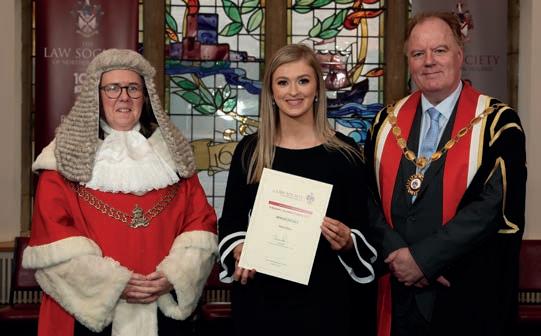


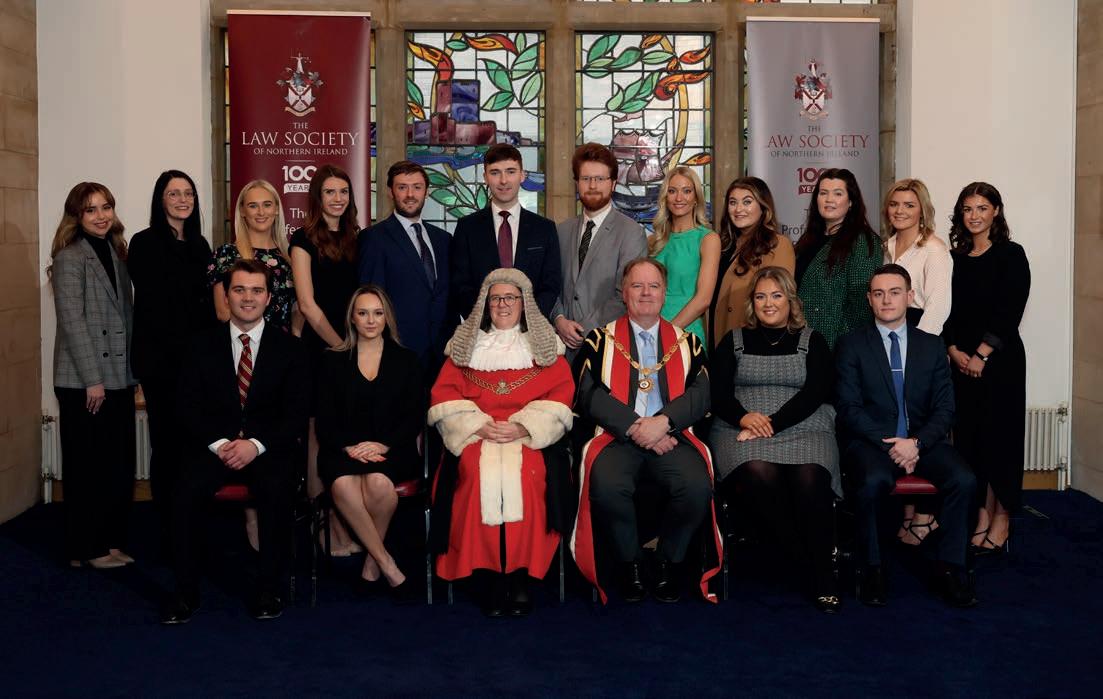
Ezine of the LSNI 25 Winter 2022/Spring 2023
President Brian Archer addresses the audience.
Dame Siobhan Keegan and Brian Archer with Hollie Dickey winner of First Prize in the Solicitors’ Accounts Course.
Dame Siobhan Keegan and Brian Archer with Alexandra Sarah Craig winner of First Prize in the Professional Conduct Course.



26 Ezine of the LSNI Winter 2022/Spring 2023


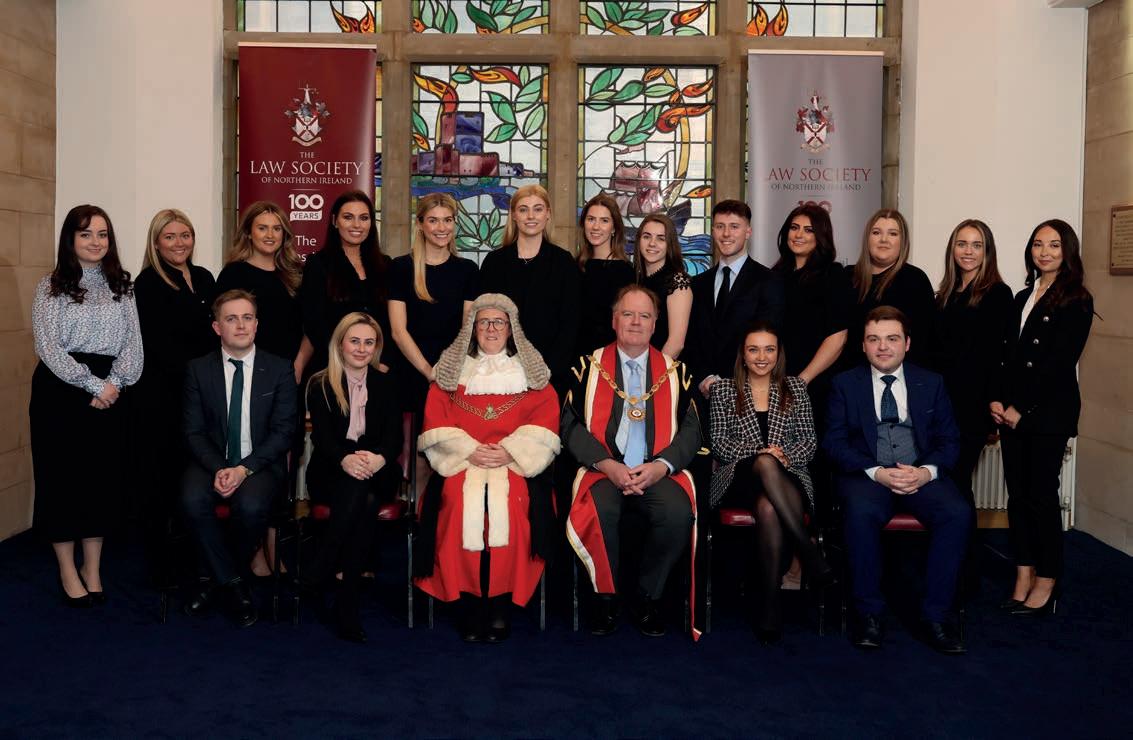
Ezine of the LSNI 27 Winter 2022/Spring 2023
THE GOOD, THE BAD, AND SOCIAL MEDIA
The American billionaire, Warren Buffett, once wrote:
“It takes 20 years to build a reputation and five minutes to ruin it. If you think about that, you’ll do things differently”.
Unfortunately, his advice continues to fall on deaf ears especially amongst celebrities, politicians, and bloggers, including Andrew Bridgen MP, Rebekah Vardy, and Kanye West, all of whom are now paying the financial and reputational penalties for their postings on social media.
They are not alone as increasing numbers of the public are falling foul of the law after posting inappropriate content on social media platforms.
Many don’t understand or care about the consequences of their actions, or the impact of their postings on their victims’ lives.
In recent years the explosion in the ‘misuse’ of social media has been cause for concern, in particular, the issue of how best to police the online world.
For the solicitor profession the problems of social media misuse have created greater opportunities, notably through representing those who have been abused and those who have been abusing.
However, there is also an expectation that solicitors themselves should understand and embrace social media as part of their working practices.
For those solicitors wishing to embrace social media there are plenty of websites which offer practical guidance about the commercial and client benefits of using social media.
However, understanding the benefits also means that solicitors need to understand the potential risks.
One of the greatest risks for solicitors participating in social media activity is the potential blurring of the boundaries between personal and professional use.

Often there is a failure to appreciate that:
1. Postings or comments, regardless of how innocuous they are will be seen, read, and forwarded on by someone.
2. Colleagues, clients, Judiciary, journalists, recruiters and regulators will read postings and comments and they may disagree or take offence.
3. Comments and postings may potentially damage a solicitor’s personal and professional reputation - or worse still, the viability of a firm.
4. Professional conduct obligations will apply even within the online environment.
There is nothing wrong with solicitors using social media platforms to comment, criticise, or praise, when appropriate, issues they feel are important.
Equally important, however, is the ability to draw back when offering thoughts, opinions, and comments - after all, let’s not forget Mr Buffett’s wise words.
Can you afford to endanger your personal and professional reputation and the future of your practice because of something you posted on social media?
28 Ezine of the LSNI Winter 2022/Spring 2023
What social media platforms are best for solicitors?
As usage of mobile devices and the internet by clients has become so prevalent, not having a social media or website presence can mean the difference between success and failure for solicitors and firms.
Not every social media platform will suit the needs of you or your firm and having the time to post, upload and comment can be difficult. Nevertheless, those interested in growing a social media presence should start small and build slowly.
Below is a short overview of some of the most well-known and effective platforms for you to consider.
LinkedIn
LinkedIn is an effective social media platform to connect users with other professionals and businesses, allowing the user an opportunity to provide their experience and demonstrate their knowledge to a global and local audience.
It is effectively a new form of online business card and is an ideal social media platform for solicitors and firms seeking to source new business and client leads.
Facebook
Facebook has undoubtedly the widest audience of potential clients; however, it is important to note that the platform has in recent years become more of a family and friends’ platform. That said, if your firm wishes to solely engage with the public then it is an excellent platform
THE DOS AND DON’TS OF SOCIAL MEDIA USE
to promote you or your solicitor firm on social media without lots of pressure. It is also worth noting that, while Facebook allows users to recommend you to others, it also allows users to post negative comments on your feeds which can be difficult to remove and block.
Twitter
The basic rule for Twitter is that anything short and to the point is perfect. The platform allows the user to follow organisations and influential people. Tweeting can be restrictive in terms of comments and conciseness is the watchword on this platform. A mix of consistent content sent at peak times is generally the best strategy for a successful Twitter profile. Tweeting comes with a warning that what you tweet or retweet can come back to haunt you!
YouTube
YouTube is a fantastic resource for solicitors to upload, post and make videos using the right tools. If you’re seeking to showcase your firm or something of importance, having a YouTube channel allows you to feature short but relevant information. It is a useful platform to host content which can be shared on other platforms such as LinkedIn, Facebook or Twitter.
Instagram
Instagram’s popularity continues to skyrocket yet most solicitor firms and solicitors do not have a profile. Depending on the content
DOS
• Do use social media to network and connect with other professionals.
• Do make sure to maintain a professional image and avoid posting anything that could be considered unprofessional or inappropriate.
• Do use social media to share relevant news and updates about the legal profession and your firm.
• Do post content offering your insights and expertise on particular subject matters.
• Do keep in mind that anything you post on social media can be easily accessed by the public, so be mindful of what you share.
posted it allows potential clients an opportunity to access a profile of your firm (or you) which they won’t see on LinkedIn or Twitter. It is ideal for building your brand, as well as potential clients.
Adverts on social media platforms
Increasingly, social media platforms such as LinkedIn and Facebook provide the option to pay for more visibility, which is good for presenting your brand to new clients. Twitter has an advertising function also.
Whilst this may be of benefit, it is important to remember that paid advertising can be short-lived and expensive.
Conclusion
Social media platforms can be a bit hit and miss depending on the interest shown by the user and their willingness to engage online. The results in terms of enquiries and responses can reflect the comments, postings and uploads on the part of a solicitor or firm. Social media platforms require a certain level of professionalism, and this must be reflected in the content which is uploaded. After all, it is a window to your firm and your professional services so inappropriate content and behaviour may have a lasting impact on your business.
The dividend is possible revenue brought in from increased awareness of your firm.
DON’TS
• Don’t use social media to share confidential or privileged information.
• Don’t use social media to promote yourself or your firm in a way that could be considered unethical or unprofessional.
• Don’t engage in arguments or disputes with others on social media.
• Don’t post anything on social media that could damage your reputation or the reputation of your firm.
Ezine of the LSNI 29 Winter 2022/Spring 2023
Here are some general guidelines for solicitors when it comes to using social media:
NIYSA 2023 Committee
On Monday 30th January 2023, Shannon Gawley was elected Chair of the Northern Ireland Young Solicitors’ Association (“NIYSA”) at its Annual General Meeting at Law Society House.

Ms Gawley is a solicitor in the Commercial team at Carson McDowell and an Executive Officer of the European Young Bar Association.
She is supported in her year as Chair with the assistance of the 2023 committee:
• Vice Chair – Ellen Forester (Tughans);
• Treasurer – Ross White (GRAHAM Group);
• Secretary – Hannah Stewart (Carson McDowell);
• Membership Secretary – Emma Falloon (Kennedys Law);
• CPD Co-ordinator – William Wilson (Thompson Crooks);
• Member Engagement Officer – Katherine Macauley (Joseph Magee & Co);
• Committee Member – Shannan Greer (Thompson Crooks);
• Committee Member – Oonagh Lavery (EJ Lavery & Co Solicitors);
• Immediate Past-Chair – Ruaidhrí Austin (Lacey Solicitors); and
• IPLS Representative – Katherine Grant (Carson McDowell).
The committee’s theme for 2023 is “Future of the Profession” with a particular focus on three key areas:
i. Education & Career Development;
ii. Social Networking; and
iii. Mental Health & Wellbeing.
In addition, the committee is excited to announce the establishment of the new role of “Member Engagement Officer”, which will be undertaken by Katherine Macauley. The role will focus on increasing member engagement and establishing links with local solicitor associations across Northern Ireland.
Chair’s Message
I am delighted and deeply honoured to have been elected as Chair of the Northern Ireland Young Solicitors’ Association for the coming year. My sincerest appreciation and thanks to our immediate past chair, Ruaidhrí Austin, and outgoing committee members William Nugent, Natasha Moffett, Robert Bellingham and Colleen Ward for their tireless efforts and assistance which they have provided to the association throughout the past number of years.

I would also like to sincerely thank and express my gratitude to the Law Society of Northern Ireland for their long-standing support of the NIYSA.
The past few years have been a challenging time for many in the legal profession, particularly for our members starting off in their careers. As we navigate through the implications of Covid-19, the cost-of-living crisis and any other hurdles life might bring us, it is my hope that the NIYSA will continue to flourish as an association and show the resilience, integrity and tenacity of spirit that young solicitors in Northern Ireland have.
I am delighted to announce that my theme for this year as Chair is “Future of the Profession”. Looking to the year ahead, with the help of the newly elected committee, I am excited to build on the great work of the association to date and will endeavour to continue to strengthen long-lasting networks with our counterparts in the UK, Ireland and our colleagues across Europe and further afield.
Shannon Gawley Chair, NIYSA
30 Ezine of the LSNI Winter 2022/Spring 2023
CLAIM!
Professional Indemnity Claims
What to do & what not to do if you receive a professional indemnity claim

Guidance and advice

Ezine of the LSNI 31 Winter 2022/Spring 2023
Receiving or even waiting for a formal professional indemnity claim can be both daunting and a stressful experience for anyone. Knowing what to do and who to speak to is often the biggest challenge facing Members worried about making decisions which will have implications for themselves and their practice.
The following information has been prepared to provide guidance and support to ensure Members know what to do, and what not to do in the event of a professional indemnity claim.
This guide has been prepared by Jonathan Stockton who worked in the insurance claims sector as a Chartered Loss Adjuster for over 35 years.
The Society has engaged Jonathan as an independent consultant in insurance claims to assist Members through the process by offering access to his knowledge, expertise and insight. All communication with Jonathan will be conducted in strict confidence.
What shouldn’t you do if you receive a claim?
1 Do not panic!
• You are insured for professional mistakes if you have made one.
• The claim might simply be a ‘try on’ or directed at you in error.
• Often these matters can be easily rectified.
2 Do not take the claim as a personal insult!
• It is easy to regard a professional indemnity claim as a personal slight.
• Simply accept that from time to time differences of opinion will occur and claims will arise.
• It is part of modern business life and we have to deal with these challenges in a professional manner.
3 Do not act like an ostrich!
• Do not stick your head in the sand and ignore the problem – it will not go away.
• If you ignore it the problem will become more difficult to deal with and probably more expensive.
4 Do not notify the claim late!
• Professional indemnity insurance is written on a ‘claims made’ basis which means that claims are dealt with by the insurers who are on cover when the claim is first made and notified to the insurers or your broker.
• Claims arising from work you did years ago will be dealt with by your current insurer.
• It is vital that claims are notified promptly.
• If a renewal occurs and insurers are presented with claims that should have been notified during the previous year of account this will cause difficulties.
5 Do not prejudice your / your insurer’s position!
• Of course deal with complaints using your usual complaints procedure.
• If a very small matter needs modest expenditure - say for rectification of title - to fully resolve it go ahead and deal with the matter if you are certain that action completely finalises the issue.
• You might be tempted to try and deal with a matter within your excess or to avoid possible future premium loadings. Be careful - claims can seem to be of a low value, but they can ‘grow legs’ and become significantly more expensive.
• When faced with a formal claim do not take any action directly with the claimant. You might do or say something that renders a claim indefensible which could affect your cover under your insurance policy.
Do not enter into discussions or correspondence with the claimant/their representatives unless this action has been agreed and approved in advance by your insurers (or their representatives).
6 Do not let possible future policy loadings cloud your judgement! Policy loadings will not potentially count in premium calculations for circa three years so we have at least a couple of years to deal with the claim before this might become an issue.
• If the claim is resolved incurring defence costs only or for less than £5,000 then it does not count towards policy loadings at all under the current scheme.
• For notifications that are not yet a formal claim often your brokers / insurers will adopt a notional £99 notification only reserve. This has no bearing on any future premium implications.
• To delay notification can have serious implications regarding your policy cover.
32 Ezine of the LSNI Winter 2022/Spring 2023
What should you do if you receive a claim?
1 Promptly contact the Master Policy insurance broker.
Simon Hunter Claims Advocate
T: 028 9344 6337
M: 07920 861 539
E: simon.hunter@ablinsurance.co.uk
Denise Hutchinson Claims Advocate
T: 028 9099 3625
M: 07879 107888
E: denise.hutchinson@ablinsurance.co.uk
2 Notify them of the matter.
3 Contact Jonathan Stockton on 07593 291912 or at the email address PII@lawsoc-ni.org for free guidance and help.

4 Provide full details to the brokers / insurers.
5 Be honest, open and provide a full file of papers to them as this will garner a better response.
6 If you have a formal claim made against you, or you are aware of circumstances that are likely to result in a claim, promptly notify your brokers and obtain an acknowledgement and claim reference number from them.

7 Once you have done the above you will have the reassurance that your ‘back is covered’ and the comfort of knowing that the matter will be defended or dealt with as appropriate, and if required you will have the benefit of a defence panel solicitor to deal with the matter on your behalf.
Who should I contact for FREE confidential advice and guidance?
Jonathan Stockton LL.B (Hons), FCILA is an independent Insurance Claims Consultant who has been appointed by the Law Society of Northern Ireland and is accessible to all Members. He can provide confidential guidance and reassurance in claims matters, from initial notification of a claim (or potential claim) and throughout the entire claims process.
Contact Jonathan Stockton on 07593 291912 or at PII@lawsoc-ni.org for free guidance and help.
Ezine of the LSNI 33 Winter 2022/Spring 2023
Law around the world
Job uncertainty matches stress among lawyers’ biggest concerns | News | Law Gazette
UK
LawCare’s 2022 annual report findings
‘Legal professionals could be reflecting on what they want from life and work and be less willing to stay in careers or workplaces that don’t meet their needs and expectations and could be undermining their mental health,’ Elizabeth Rimmer, Chief Executive Law Care.
Calls from lawyers worried about their career prospects have increased greatly in the last year, a legal mental health charity has revealed. LawCare’s 2022 annual report states that nearly a quarter of people (22%) contacting the support service were primarily concerned about their jobs. In the previous year, just 8% of calls related to careers. For the first time, the proportion of people with career concerns equalled the number of legal professionals seeking help because of stress.
The rise of “greenwashing” litigation
Holland
“Greenwashing” (also known as “green sheen”) is when a public body or company describes its operations or its products as more environmentally friendly or “green” than they actually are. In 2022, Dutch campaigners Fossielvrij NL supported by ClientEarth and Reclame Fossielvrij have combined to bring a lawsuit in the Netherlands under the European Union’s Unfair Consumer Practices Directive against Dutch airline
KLM after it refused to stop advertising its Fly Responsibly campaign which launched in 2019.
The claimants argue that there is no such thing as “flying responsibly”. No decision has yet been reached by the Dutch courts.
First transparency order opens family case to reporters
England & Wales
Mr Justice Poole has made what is to be believed to be the first transparency order to allow reporting of a case in the Family Courts, the Gazette reports. The order has been made under a wider pilot currently being carried out in the Family Courts in Leeds, Cardiff and Carlisle. Reporting restrictions are still in place to protect the identities of children involved.
Supreme Court rules emoji is no laughing matter
Italy
Italy’s Supreme Court has ruled that the use of emojis may be considered defamatory when used in a post describing someone’s physical disability. A man’s conviction for his use of emojis in a social media post,
overturned by an appeal court, was later upheld by the country’s Supreme Court who discussed the difference between insult and defamation.
Green lease clauses to support climateconscious landlords and tenants Republic of Ireland
A number of clauses have been drafted for environmentally conscious landlords and tenants in the commercial sector by the Chancery Lane Project in conjunction with Arthur Cox, Byrne Wallace and Mason Hayes & Curran. The three new clauses have been named after children to reflect the impact actions will have on future generations.
34 Ezine of the LSNI Winter 2022/Spring 2023
Irish Rule of Law International

In operation since 2007, Irish Rule of Law International is a project-orientated, nonprofit initiative working to improve access to justice in fragile democracies all over the world. Initially established by the Law Society of Ireland and the Bar Council of Ireland, the Law Society of Northern Ireland and the Bar of Northern Ireland joined as partners in 2015. From very small beginnings, the IRLI team now comprises 15 people, working in legal and non-legal roles worldwide.
The guiding idea behind the foundation of IRLI was to use the expertise of Irish and Northern Irish lawyers to help strengthen rule of law and access to justice globally. This has led to the development of programmes in, among elsewhere, Malawi, Tanzania, South Africa, and Zambia. Common to all of these programmes is our aim of strengthening legal structures to ensure the human rights and dignity of everyone who comes into contact with the law.
Currently, the largest of our programmes is in Malawi, where we have been active since 2011. Supported by Irish Aid in Malawi, our work on the ground focuses on increasing capacity within the criminal justice system and improving the ability of detainees and accused people to access legal aid. This work is badly needed: at present, the Malawian prison system is operating at 300% capacity, with severe overcrowding and food shortages.
However, a big part of our work also lies in education and prevention – supporting adolescents who have already come into contact with the law, for example, or educating magistrates and wider communities about legal issues. For us, strengthening the rule of law and access to justice requires a holistic approach.
Last April, we launched a new programme in Zambia. Supported by the Irish Embassy in Zambia, one of its two main aims is to use the rule of law to tackle corruption in the country. Training is also a key part of this work. In December, two senior Irish Judges contributed to a remote training workshop for members of the Zambian Judiciary. In a few weeks, we are holding a week-long judicial and prosecutorial training programme in Lusaka led by Irish and Northern Irish lawyers, Judges and senior prosecutors. Our work in Tanzania tracks a similar path – sharing knowledge with its Judiciary to help strengthen the system from the ground up. Recently, for example, we were delighted to host four esteemed Tanzanian Judges (pictured), as part of our ongoing collaborative work to increase capacity and improve the handling of child sexual abuse in the country.

Across all of our programmes we emphasise dialogue and collaboration, rather than any top-down approach. It is clear to us that the
direction and focus must be laid out by the communities we are working with. Whether in Malawi, Zambia or Tanzania, this means working in constant collaboration with local partners across the Judiciary, police, prisons, health and social welfare systems, and following their lead.
IRLI is proud to support the pro-bono pledge, and firmly believes that members of the legal profession in Northern Ireland and Ireland are uniquely placed to ensure access to justice through the provision of pro-bono legal services. We’re really grateful for all the pro-bono assistance we have received so far, and look forward to further partnerships with solicitors and barristers who have joined the pledge. So, if you are a member of the legal profession and would like to get involved or learn more about our work, please do get in touch. There is certainly lots of work to be done.
www.irishruleoflaw.ie
Anne-Marie Blaney, Programme Lawyer Northern Ireland, Irish Rule of Law International
Ezine of the LSNI 35 Winter 2022/Spring 2023
Clockwise from top left: Anne-Marie Blaney (IRLI), Ms Oliva Kinabo, Hon. Ms Valentina Katema, Lady Chief Justice, Dame Siobhan Keegan, Hon. Ms Justice Joaquine De-Mello, Hon. Mr Justice Amour Said Khamis and His Honour Judge Geoffrey Miller at the Royal Courts of Justice Belfast.
Solicitor Groups
APIL – ASSOCIATION OF PERSONAL INJURY LAWYERS (N.I. BRANCH)
The Association of Personal Injury Lawyers (APIL) is a not-for-profit campaign group which has been committed to injured people for more than 30 years. Our vision is of a society without needless injury but, when people are injured, they receive the justice they need to rebuild their lives. We have around 3,000 Members across the UK who are committed to supporting the Association’s aims, and all are signed up to APIL’s code of conduct and consumer charter.
CLIMATE JUSTICE GROUP
The Climate Justice Group operates under the umbrella of the Future of the Profession Committee of the Society. The core aims of the Group are to take proactive steps to address climate change issues affecting the solicitor profession in Northern Ireland and to promote and enhance the role of solicitors in tackling the climate emergency.
CLINICAL NEGLIGENCE PRACTITIONER’S GROUP
The purposes of the Group are:
• To promote the interests of justice and of all Plaintiff and Defendant clinical negligence practitioners in the jurisdiction of Northern Ireland.
• To offer a networking forum for the Group.
• To exchange knowledge among Group Members.
• To establish connections with all appropriate bodies, associations and similar groupings with an overall aim to promote interests of the Group.
• To promote, organise and conduct lectures, seminars, meetings and events that may interest members of the Group and other practitioners who have an interest in clinical negligence aiming to ensure that Members are up to date with developments.
• To promote and develop best practice in this jurisdiction drawing from the experience in Northern Ireland and elsewhere.
• The Group must report to the Clinical Negligence Management Board, which is a subgroup of the Contentious Business Committee of the Society.
The Group must always operate within the overall policy of the Law Society of Northern Ireland.
Membership is open to any person who is on the Roll of Solicitors in Northern Ireland and has a medical negligence practice or an interest in this area of practice.
COMMERCIAL PRACTICE GROUP
The Commercial Practice Group was established by the Law Society for solicitors who are working in or who have an interest in the general area of business and commercial law and practice.
The Group encompasses a broad range of practice areas within the general field of business and commercial law and practice, such as:
• Banking & Finance
• Commercial Law
• Company Law
Construction Law
• Energy Law
• Intellectual Property
• Mergers & Acquisitions
• Pensions Law Procurement Law
• Restructuring & Insolvency
The Commercial Practice Group has a Steering Committee which reports to the NonContentious Business Committee of the Society.
Contact details:
Executive Committee Member: Oonagh McClure, Thompsons OonaghMcClure@Thompsons.law.co.uk
Secretary: Lois Sullivan, MacElhatton Solicitors lois@macelhatton.com
Contact details:
Chair: Rowan White,Arthur Cox
General Enquiries: policy@lawsoc-ni.org
Contact details:
Chair: Paddy Mullarkey, O’Reilly Stewart Solicitors patrick.mullarkey@oreillystewart.com
Board Members: Caoimhe Connolly, BSO caoimhe.connolly@hscni.net
Marysia Kelly, John J McNally & Co mkelly@jjmcnally.co.uk
Laura Menary, DWF laura.menary@dwf.law
Roger McMillan, Carson McDowell roger.mcmillan@carson-mcdowell.com
Hannah Simpson, Wilson Nesbitt hsimpson@wilson-nesbitt.co.uk
Contact details:
Chair: Rowan White, Arthur Cox (Steering Committee)
General Enquiries: policy@lawsoc-ni.org
36 Ezine of the LSNI Winter 2022/Spring 2023
ELDER LAW GROUP
The Elder Law Group consists of solicitors who are interested in the affairs of elderly and vulnerable clients. The Group considers issues such as capacity, wills, powers of attorney, living wills, tax and estate planning, trusts, probate, asset preservation, care fees and funding, elder abuse and the Office of Care and Protection.
EMPLOYMENT LAWYERS GROUP NI
The Employment Lawyers Group NI is a group of lawyers representing the interests of employment lawyers in Northern Ireland. Our objectives are to provide education and training, to organise meetings and conferences to offer a forum to discuss and debate employment law, to develop links with other organisations and associations in employment law, and to act as a consultative body on employment law, practice and procedure.
The ELGNI has been in existence for almost 25 years and is an association of almost 100 lawyers from both branches of the legal profession encompassing specialist employment lawyers and those with a more occasional engagement in the area of employment law.
Our membership includes those whose client bases are both employee- (or ‘Claimant’) and employer- (or ‘Respondent’) oriented and we attempt to provide an open and helpful platform for discussion and development in line with our objectives.
Most of our focus is on areas falling within the jurisdiction of the Industrial Tribunals and Fair Employment Tribunal in Northern Ireland; however, we also educate, discuss and respond to issues in the wider employment law jurisdiction, including matters falling within the jurisdiction of the County Court, High Court, Northern Ireland Court of Appeal, and extrajurisdictional issues and developments that affect Great Britain and the Republic of Ireland.
Annual membership is £45.00, with seminars costing £10.00 each to attend for Members. If you would like to join, please contact our Secretary, Sarah Cochrane, at Sarah.Cochrane@ carson-mcdowell.com.
More information is available on https://www.elgni.co.uk/
IMMIGRATION PRACTITIONERS’ GROUP
The purposes of the Immigration Group are:
To promote the interests of immigration practitioners in Northern Ireland, to share knowledge amongst immigration practitioners, to provide representation for immigration practitioners where necessary and to provide a networking forum.
• To maintain contact with and make suggestions and representations to all appropriate bodies, including community groups, other similar associations and the Law Society of Northern Ireland, with a view to promoting the interests of immigration practitioners.
• To promote, organise, sponsor, conduct (or co-operate with any other person, association or organisation in so doing), lectures, seminars, meetings and events that may be of interest to members of the group as well as to other solicitors with an interest in immigration law.
Contact details:
Chair: Linda Johnston, Acting Co-ordinato silverbrown21@icloud.com
Contact details:
Chairperson: Ryan Cushley, Bar Library ryan.cushley@barlibrary.com
Vice Chairperson: Emma McIlveen, Bar Library emma.mcilveen@barlibrary.com
Secretary: Sarah Cochrane, Carson McDowell Sarah.Cochrane@carson-mcdowell.com
Treasurer: Aisling Byrne, Al Goodbody aibyrne@algoodbody.com
Contact details:
Chair: Una Boyd, CAJ una@caj.org.uk
Secretary: Brian Moss, Worthingtons brian@worthingtonslaw.co.uk
Ezine of the LSNI 37 Winter 2022/Spring 2023
IN-HOUSE LAWYERS GROUP NORTHERN IRELAND (IHLGNI)
The In-House Lawyers Group Northern Ireland (IHLGNI) was established in 2014 to promote the interests of in-house solicitors working in Northern Ireland and, in particular, to deliver Continuing Professional Development appropriate to in-house lawyers, and provide a networking forum for Members.

Membership of the IHLGNI is free and is open to all persons who are enrolled as solicitors or barristers and who practise or are employed in an in-house legal adviser capacity in Northern Ireland. If you wish to register as a Member of the IHLGNI, or to be kept informed of upcoming events and developments, please email: inhouselegalgroupni@gmail.com.
The IHLGNI aims to provide a number of CPD events each year on topics particularly relevant to in-house lawyers, together with social and networking events tailored to its Members.
Contact details:
Chair: Ciarán Fegan, GRAHAM Group ciaran.fegan@graham.co.uk
Secretary: Julie-Ann McCaffrey, Greentown Environmental julie-ann@greentownenvironmental.com
Treasurer: Anne MacRandal, Autism Initiatives Anne.MacRandal@ai-ni.co.uk
Events/ CPD Co-Ordinator: Emma O’Donnell, BT emma.3.odonnell@bt.com
LAW TECH GROUP
The Law Tech Group operates under the umbrella of the Future of the Profession Committee of the Society.
The core aim of the group is to consider and help address the impacts, challenges and opportunities for the solicitor profession arising from technological developments.

Contact details:
Chair: Kerry McCloy, CFR
General enquiries: policy@lawsoc-ni.org
38 Ezine of the LSNI Winter 2022/Spring 2023
LEGALLY ABLE GROUP
The purposes of the Group are:
• To raise disability awareness amongst members of the legal profession in Northern Ireland with a focus on the person rather than on the disability.
• To raise awareness of the challenges faced in recognising disability and in making appropriate adjustments, so as to promote inclusivity and to provide a high quality legal service sympathetic to the needs of the disabled community.
• To strive to create and promote equal opportunities for disabled colleagues;
• To encourage and support participation by disabled colleagues in opportunities for advancement within the profession.
• To encourage and support participation and engagement by disabled colleagues with the Council of the Law Society and Law Society Committees and Working Groups.
• To provide meaningful support for those who face challenges relative to disability, whether as members of the solicitor’s profession, members of the wider legal community, or when interacting with the legal community.
• To run events to further the purposes of the Group.
• To carry out all such other activities as shall be appropriate pursuant to these purposes.
STEP
STEP is a global professional body, comprising lawyers, accountants, financial advisors, trustees and other practitioners that help families plan for their futures.
The STEP mission is to inspire confidence in families planning their assets across generations by setting and upholding high professional standards, informing public policy, promoting education, and connecting practitioners globally to share knowledge and best practice. Full STEP members, known as TEPs, are internationally recognised as experts in their field, with proven qualifications and experience.

All STEP Members belong to a branch or chapter that provides professional development and networking at a local level. There are over 100 branches and chapters across the world.
The Northern Ireland branch was established in and around 2006 and currently has 100+ Members. The Committee sits around eight times per year and arranges events for both its Members and non-Members.
There are varying memberships with variable joining fees. For more details, please visit https://www.step.org or email the NI branch secretary with any queries. We would love to hear from you.
SOLICITORS CRIMINAL BAR ASSOCIATION
The SCBA was set up to represent legal practitioners who operate in the criminal field of law, including all aspects from police station to court and to prison. We are there to provide information on the ever-changing nature of this area of law, and to provide representation and advice to Members about courts and remuneration. The Association is open to all solicitors who operate in this area, no matter what size their practice. The Association works closely with the Law Society in all matters. There is a joining fee of £200 per firm and a renewal which is sought on an infrequent basis.
Contact details:
Chair: Sheila McGivern,DSO sheila.mcgivern@finance-ni.gov.uk
Secretary: Heather McLarnon, BSO heather.mclarnon2@hscni.net
Contact details:
Chairperson: Robert Stevenson, SRG Financial robert@srgfinancial.com
Vice chairperson: Fiona Hall, BDO Chartered Accountants fiona.hall@bdoni.com
Secretary: Peter Thompson, Thompson Mitchell Solicitors petermthompson@thompsonmitchell.co.uk
Treasurer: Helen Allen,GMcG Chartered Accountants allenh@gmcgca.com
Contact details:
Chairperson: Noel Phoenix, Trevor Smyth and Co noel@trevorsmyth.com
Secretary: Pearse MacDermott, McCann & McCann, Solicitors pearse.macdermott@mccannandmccann.com
Ezine of the LSNI 39 Winter 2022/Spring 2023
The In-House Lawyers Group NI

Since its inception in 2014, the In-House Lawyers’ Group Northern Ireland (INLGNI) has become recognised as the representative organisation for in-house lawyers in Northern Ireland.
The principal objectives of IHLGNI are to promote the interests of in-house lawyers, and to share knowledge through appropriate communications channels, our Continuing Professional Development (CPD) programme and by further developing a successful networking forum for its membership.
At the first meeting of the new 2022/23 IHLGNI committee on 27th October 2022, the following officers were nominated:
• Ciarán Fegan (Graham Group), Chair.

• Julie-Ann McCaffrey (Greentown Environmental), Secretary.
• Anne MacRandal (Autism Initiatives Group), Treasurer.

• Emma O’Donnell (BT), CPD Events Secretary.

• Sean Grego (Citibank), Committee Member.
• Holly Poots (BT), Committee Member; and

• Claire Marley (Coca-Cola), Committee Member.

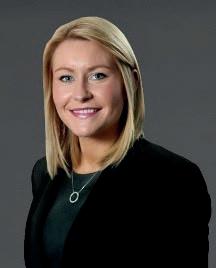
Commenting, the newly appointed Chair of the IHLGNI committee and the General Counsel for Graham Group, Ciarán Fegan, said:
“I am delighted to have been re-elected onto the IHLGNI committee and to take up the position of Chair, a position which I am honoured to have held previously at the formation of IHLGNI back in 2014. I would like to express my thanks, and those of the newly convened committee, to our outgoing committee members Niall McPeake and Kathryn Walls for all their hard work and dedication during an incredibly busy 2021/22.

The past year was the busiest in the history of IHLGNI, notwithstanding that much of that year was spent still subject to COVID restrictions. We have held our first in-person event since 2019 and based on the valuable feedback received from our Members, we intend to start reintegrating in-person and social events to our very successful series of webinars.
I look forward to working with the new committee in the months ahead promoting the interests of in-house lawyers in Northern Ireland and delivering CPD and networking events to support our Members’ needs.”
The IHLGNI would like to thank its supporters and contributors, in particular, A&L Goodbody, Pinsent Masons, Eversheds, TLT, Gateley Legal and Abacus Recruitment. Without the support of local law firms and business, IHLGNI would not be able to deliver the breadth of events for its Members.
The Group has grown from strength to strength over the last number of years with increasing membership numbers, solid engagement and a diverse timetable of events.
Mr Fegan further commented:
“We have noted a vast increase in the number of lawyers engaging with IHLGNI in recent times. This is representative of the current legal climate across the UK and Ireland with many reports suggesting that in-house practice is the fastest growing sector in the legal profession.”
According to a 2019 Law Society of England & Wales report, in-house lawyers now make up almost a quarter of the profession. The Law Society of NI’s 2022 Hook Tangaza Consultancy Report notes that a fifth of the regulated profession now works in public, corporate or third sector roles. The IHLGNI believes that the demand for in-house lawyers in Northern Ireland will continue to rise with increasing recognition of the valuable skills and expertise that in-house lawyers offer businesses, public bodies and third sector organisations.
About IHLGNI
Membership of the IHLGNI is open to all persons who are enrolled as lawyers and who practise or are employed in an in-house legal adviser capacity in Northern Ireland. If you wish to register as a Member of the IHLGNI, or to be kept informed of upcoming events and developments, please email: inhouselegalgroupni@gmail.com.
40 Ezine of the LSNI Winter 2022/Spring 2023
L-R: Ciarán Fegan, Julie-Ann McCaffrey, Anne MacRandal, Emma O’Donnell, Sean Grego, Holly Poots and Claire Marley
LawCare: Debunking the Myths and setting the Record Straight
I couldn’t contact LawCare because…
1. …someone will find out
You don’t need to worry. We won’t ask for your roll number or details of your workplace and you don’t have to give your name. You choose how much information you want to give. We are independent of professional bodies and regulators, reporting nothing to them beyond statistics.
2. …the person on the helpline might know me or recognise my voice
Our volunteers and staff are based all over the UK so this situation is unlikely to arise. If it were to happen, you can choose to continue your call safe in the knowledge that anything you say will be treated with confidence or you could leave your details requesting another member of our team to call you back.
3. …they won’t be able to talk to me because I’m not a solicitor
We support solicitors, barristers, law students, trainees, paralegals, support staff and concerned family members of those working in the profession. We are the mental wellbeing charity for the legal profession and are here to help all branches of the legal sector from student to retirement.
4. …my problems aren’t bad enough, I know that other people have it much harder
Your feelings are valid whatever you are facing or going through. We are here to listen and offer emotional support. It
As LawCare’s Engagement and Relationship Manager Niamh Warnock works from her base in Belfast to build and develop relationships across the solicitor profession in Northern Ireland. Having worked for 14 years in private practice, she believes that LawCare can support more people in Northern Ireland and wants to ensure that LawCare’s services are well known but appreciates some may be reluctant to reach out. Niamh sets out below LawCare’s responses to some of the reasons why members may hold back from contacting LawCare. She hopes these will alleviate any potential worries.
is better to call when an issue is just starting and to seek support before matters escalate.

5. …I don’t have a mental illness
There is no minimum threshold for contacting LawCare. We believe mental health needs to be looked after as much as physical health is. We want you to know that whether you’re having a bad day and just don’t feel yourself, or if your issue is longer lasting, we’re here for you.
6. …no one will understand what I’m going through
All of our volunteers and staff have worked in the law and understand the particular pressures of the sector. We can also offer ongoing peer support to callers. Our peer supporters may have been through difficult times themselves and can offer one-to-one support and friendship.
7. …it won’t help me
Our callers often let us know that they feel a little better after just one call. Sometimes reaching out and getting a chance to offload to someone who can empathise with what you are going through can help get you back on track. We recently carried out a survey with our callers three months after their initial contact and found that 98.5% said they would recommend LawCare to others.
8. …I’m too embarrassed, what would others think of me?
We encourage our callers to practise selfcompassion. We suggest thinking about
how you would advise friends, family or colleagues if they had a similar problem. Would you judge them? Usually the response is that you would offer support. Please don’t deny yourself the opportunity to seek support, don’t risk becoming more unwell or unhappy before taking that step.
9. …I’m so overwhelmed I might get upset on the call
Please don’t worry, this isn’t uncommon, no one will judge you. If you need to take a moment our team will give you that time, there is no rush and there will be no time limit on your call. If you feel that it would help you to instead write down how you are feeling then maybe you might prefer to contact us via our support email or by online chat.
10. …there is so much going on in my head and I might not be able to put into words what I want to say
That’s ok, you can take your time. Picking up the phone is a good first step. Our helpline staff and volunteers are trained to listen, and can help you break down your issues talking through whatever you want to address, taking it one step at a time.
It takes courage to reach out, seek support and share what you are going through but if you feel ready please contact our helpline on 0800 279 6888, email support@lawcare.org.uk or access our online chat and other resources at www.lawcare.org.uk
We understand life in the law. We’re here to listen. We’re here to support you.
Ezine of the LSNI 41 Winter 2022/Spring 2023
include YOUTH
President’s Charity of the Year 2023
Our approach
Adopting a youth work approach, we walk alongside young people to provide life-changing opportunities. We provide a tailored wrap-around service that helps young people gain qualifications and employability skills, develop selfconfidence and a better understanding of cultural diversity and inclusion.
Policy and Advocacy
We work to raise key issues that affect young people at a government level and advocate to ensure that the lived experiences of young people are heard. We have submitted a range of policy responses including:
rights and potential of all children and young people. We have over 40 years’ experience of working with care experienced young people and young people from disadvantaged communities.
Working with young people aged 14-24, we offer services to improve employability, personal and social development, enhancing inclusion, integration and good relations. We influence public policy led by the voice of children and young people, evidence-based practice and international children’s rights standards.
• Refugee and Asylum Seeker Integration Strategy
• Regional Model of Service for Separated and Unaccompanied Asylum-Seeking Children
Case Study
• New Custodial Arrangements for Children
• Transitioning Youth Justice Strategy
• Increasing the Age of Criminal Responsibility
• Skills Strategy
We recently started an exciting new programme which employs 15 young people with care experience to take on the role of mentor and advocate. The Expert By Experience Youth Mentors have just conducted their first series of focus groups, speaking with 29 young people from across all our offices, about what supports are needed for care leavers. They have submitted their findings to the Department of Health’s ‘Adoption and Children Act (NI) 2022 Support for Care Leavers’ consultation. This epitomises young people leading the way and acting as advocates for their peers. There will be much more to come from this dynamic group of young changemakers.
My name is H, I am 19 and from East Africa. I had to leave my country and travelled alone, arriving in Northern Ireland 3 years ago. I was placed in a foster family and then moved into my own place.
I enjoyed going to Give & Take because I got to meet lots of different young people, some from my own country. We even had a culture day, where we all made our native food and shared with staff and young people, so everyone got to try something new.
I really loved Give & Take. It doesn’t feel like school or training, you can learn while having fun with other people and you can really be yourself. The staff always plan fun and interesting activities, and I’ve had the chance to do things I wouldn’t have otherwise had. There was always plenty of food for us to eat while training.
One thing that really helped me was working with my youth worker. Sometimes young people would be worried about what was going on in their home country, or had issues with their family, or were just feeling bad and having a bad day. I liked that I could trust him to understand and support me when I needed it.

My confidence has grown through being at Give & Take. I have enhanced my language skills as well as achieving my Level 2 in Literacy and ICT. There are always challenges in life, and I have faced the challenge of meeting new people, starting a new life, experiencing racism, isolation and unemployment but having the support of staff has made my journey easier. I have been able to go into further training, I’ve accessed employment through Jobstart, and have a job coach to help me with this. I’ve also started my driving lessons.
I am living independently, and love having my own space. It can be hard to manage budgeting, cooking, cleaning, working and training, and getting used to being on my own but I am happy with my life.
Funding Situation
The majority of our funding is from the European Social Fund which will end in March 2023. This is being replaced by the UK Shared Prosperity Fund; however, there is a significant shortfall. Our staff and young people have been lobbying our Government asking them for urgent action to replace these monies. This not only impacts our young people but also up to 1300 voluntary sectors workers.
We started a youth-led campaign and asked the young people what they wanted to say to those making decisions and the message was clear.
‘DON’T LET US DOWN!’
Get Involved
If you would like to support the work of Include Youth you can help by:
• Following us on our social media channels @includeyouth
• Taking part in the Legal Walk/Run happening on Friday 12th May
• Signing up to the Belfast Marathon and running for Include Youth
Contact:
julieb@includeyouth.org for further information
42 Ezine of the LSNI Winter 2022/Spring 2023
At Include Youth, our vision is of a society that realises and fulfils the


Ezine of the LSNI 43 Winter 2022/Spring 2023 Save the Date - Friday 12 May 2023 In support of Include Youth
LK /RUN LEGAL LAW SOCIETY OF NORTHERN IRELAND CLICK HERE TO REGISTER
W
BSA relay teams and Marathon entrants set to run the Mash Direct Belfast City Marathon to raise money for Employers for Disability NI.
Belfast City Marathon
30th April 2023
BSA Members, friends and family look forward to participating in the Belfast City Marathon on 30th April 2023. The Marathon, in its 41st year, is a great event and an opportunity to raise funds for local charities. This year, BSA’s chosen charity is Employers for Disability NI. If you are interested in running in one of the BSA relay teams, please get in touch by email at briege@belfast-solicitors-association. org for further details and information.
Sarah Wilson – elected Chair of BSA for 2023
Sarah Wilson of the Departmental Solicitors Office has been elected as Chair of the Belfast Solicitors’ Association (BSA), succeeding Paul Moylan of McCann and McCann.
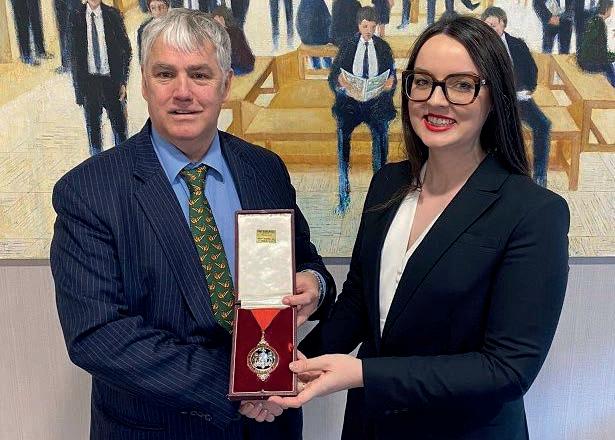
A new committee was elected at the association’s AGM in Law Society House on 25th November 2022 and at this Ms Wilson paid tribute to the previous Chair, while Ruairi Gillen, of Gillen & Co, was elected Honorary Secretary and Robert Croskery was elected Honorary Treasurer.
Ms Wilson said:
‘It is with great excitement that I take up my appointment as Chair of the Belfast Solicitors’ Association which is celebrating its 80th anniversary in 2023. I am both delighted but also astonished to be the sixth female and youngest ever lawyer to hold this role.
Throughout its history, the BSA has consistently represented its Members’ interests, lobbying government, promoting the highest standards of legal practice and organising a varied social and Continuing Professional Development programme.

In 2023, I aim to celebrate the achievements of the profession over the past 80 years and promote areas of improvement such as the employment of people with disabilities within the profession. There are a number of social events already planned as part of our celebrations, including our Gala Dinner which will take place on 10th June 2023.’
BSA has also announced their new charity partner for 2023, Employers for Disability Northern Ireland (EFDNI).
‘This year our chosen charity is Employers for Disability NI (EFDNI) which is a local charity very close to my heart. Their role is to promote the recruitment, retention and development of disabled employees.
They do this by providing training, information, advice and in-depth support for disabled employees, their line managers, colleagues and Human Resources staff. EFDNI encourages and helps local employers to adopt a Disability Positive approach where disabled people are valued and supported both in employment and as customers/services users.
They have developed a unique range of services, and are the only employer-led organisation focused solely on disability good practice in NI. They recently launched a Disability Positive Accreditation initiative which helps employers audit their disability-related employment practices, identify areas needing improvement and recognise those employers who are working at the highest level.
They provide daily support for disabled people, their managers and colleagues and engage with employers covering approximately 25% of the workforce, funded by these organisations. I look forward to supporting EFDNI throughout 2023.’

44 Ezine of the LSNI Winter 2022/Spring 2023

THE LAW CLUB
The Law Club at Law Society House in Belfast is now open!
Situated on the fourth floor, it offers a new modern, contemporary, and inviting location to have a coffee and a catch up with friends, a place to reflect or work.


With a stylish design, spacious seating areas, IT supported consultation rooms and open to all members from 9am - 5pm (Monday to Friday) the new Law Club offers a unique membership experience.

Please visit The Law Club and see for yourself what’s on offer.

From the Courtsabstracts of some recent case law
Below please find headnotes and links to the full text of selected judgments from the High Court and Court of Appeal. Please note that these headnotes are for guidance only.
ASYLUM
In the matter of an application by Abdul Said for judicial review
Challenges decision of Secretary of State for the Home Department (SSHD) to refuse to provide him with an Application Registration Card (ARC). - applicant also seeks to impugn the policy under which decision was made. - applicant had been refused asylum in the UK on third country grounds and following other asylum applications the applicant became appeal rights exhausted. - whether decision and policy underpinning are supported by the Immigration Rules. - ultra vires.fetter on discretion. - whether refusal to issue an ARC has interfered with applicant’s right to private and family life. - HELD THAT applicant’s challenge must fail and is dismissed. - However, it is unacceptable that this situation has been allowed to persist over a long period of time. - applicant should be treated fairly and with respect.
9 January 2023
Humphreys, J [2023] NIKB 1
CHILD ABUSE
In the matter of an application by JR209 for leave to apply for judicial review
Applicant is a victim of child sexual abuse by Father Malachy Finnegan whilst a pupil at St Colman’s College, Newry. - applicant sought an order for restricting the publication of his name in relation to proceedings. - disclosure of his name would also disclose intimate and distressing details of his private life. - agreed that proceedings are anonymised. - applicant’s solicitor
also believed Father Finnegan to be a RUC informer which was neither confirmed nor denied (NCND) by the Crown Solicitors Office. - solicitor sought legislative basis, PSNI policy or a public facing document underpinning NCND. - whether NCND should be applied to the particular circumstances of the applicant’s case. - reference to Scappaticci case. - HELD THAT application is dismissed. - mechanisms are in place to deal with the NCND policy as a potential defence in civil proceedings.applicant can make a complaint to the ICO.
1 December 2022
Colton, J [2022] NIKB 30
R v ZB
Appeal from a sentence imposed on 10 December 2021. - appellant had pleaded guilty to grievous bodily harm and sexual assault of a 12-day old child resulting in a brain injury. - appellant is father of child. - sentenced to a total period of 19 years’ imprisonment plus an extended licence period of 5 years. - assessment of totality. - whether sentence was excessive for the two serious offences. - HELD THAT the appeal is dismissed. - appellant has offered no real explanation or remorse for his actions. - appellant will serve at least half of the 19 years when he will be assessed for release and will remain subject to licensed supervision for 5 years after his release.
5 December 2022
Keegan, LCJ [2022] NICA 69
CORONERS
In the matter of an application by Patricia Downey for judicial review

and in the matter of a decision of a Coroner dated 19 February 2021 Appeal of decision of Rooney, J wherein he dismissed the appellant’s challenge to the decision of the Coroner refusing to recuse himself from hearing the inquest into the death of the appellant’s daughter, Michelle Downey.whether actual bias and/or apparent bias in the form of predetermination. - HELD THAT the respondent ought to have recused himself on the grounds of apparent bias. - Appeal allowed. 29 November 2022
Treacy, LJ [2022] NICA 67
CRIMINAL JUSTICE
R v Patricia Wilson
Applicant aged 17 yrs had been tried, convicted and sentenced by a judge sitting alone following statements taken at Castlereagh Holding Centre in 1978. - sentenced to 10 years imprisonment. - did not appeal conviction. - prior to interview at which she made her statements applicant had made complaints of illtreatment to a doctor. - pleaded not guilty but did not raise ill treatment allegations during her trial. - case was subject of an application to the Criminal Cases Review Commission (CCRC). - applicant seeks leave to put new evidence before the court and seeks an extension of time to appeal her convictions. - evidence largely related to events which occurred 40 years prior to oral evidence.inconsistency of accounts and events. - admissibility of statement of admission. - credibility of evidence. - disclosure. - voir dire. - HELD THAT evidence was contradictory and
unreliable and applicant cannot make a new case which should have been advanced at the trial. - application to extend time for appeal is refused. - case dismissed by a majority of 2-1, LJ Treacy dissenting.
9 October 2022
Sir Declan Morgan and Sir Paul Maguire Court Of Appeal [2022] NICA 73
CRIMINAL LAW
In the matter of Man Tai Cheuk and in the matter of the Proceeds of Crime Act 2002 Respondent and wife had been subject to a Restraint Order prohibiting disposal of assets due to their involvement in unlicensed money laundering. - neither person was allowed to remove assets from Northern Ireland. - alleged offenders who disobeyed the Order would be guilty of contempt of court. - respondent had removed monies and transferred them into his mother’s bank account. - respondent admitted the breaches and repatriated the funds into a joint account in an effort to purge his contempt.respondent also admitted to a gambling addiction. - HELD THAT respondent is guilty of contempt and the appropriate sentence is 2 months’ imprisonment. - due to the repatriation of monies and admission of guilt the sentence is suspended for a period of 12 months.
11 November 2022
Rooney, J [2022] NIKB 26
Ezine of the LSNI 47 Winter 2022/Spring 2023
INQUESTS
In the matter of an inquest touching upon the deaths of Daniel Doherty and William Fleming
Request that military witnesses be allowed to provide their witness statements through their own solicitors rather than through the offices of the investigator appointed by the Coroner. - consideration of the McElhone ([2021] NICoroner 1) approach. - consideration of the Witness Protocol for Legacy Inquests. - whether Protocol is unfair. - HELD THAT statements can be provided by the Military Witnesses through their legal representatives. - further options can be considered if required.
19 January 2023
Huddleston, J [2023] NICoroner 1
In the matter of an inquest into the death of Samuel Marshall on 7 March 1990
Application asking for Properly Interested Person (PIP) status.statements said they were with the deceased when the shooting commenced. - Samuel Marshall died following a shooting in Lurgan on 7 March 1990. - applicants and Samuel Marshall presented themselves at Lurgan RUC Station on the night of the shooting in accordance with bail conditions and were attacked shortly after leaving the RUC station. - arrangements connected with bail conditions would only have been known by the three men, those they informed and the security forces. - PIP is entitled to ask relevant questions of witnesses and will also receive disclosure to assist in preparing for an inquest. - HELD THAT both applicants are granted Properly Interested Status.
2 January 2023
Gilpin, J sitting as a Coroner [2023] NICoroner 2
INSOLVENCY
In the matter of John Martin (a bankrupt) and the Insolvency (NI) Order 1989
Trustee application. - whether damages following a personal injury action two years prior constitute “property” forming part of the bankruptcy estate.bankrupt had been in a serious road traffic accident and sustained life-threatening and life-changing injuries. - bankrupt received £719,009.26 in settlement.bankrupt did not disclose any information about the personal injury claim with the Official Receiver when questioned. - upon investigation bankrupt had disbursed to close family members and kept an undisclosed sum in cash at his home. - whether chose in action was a personal or hybrid action.HELD THAT it was a personal action as damages flowing from claim are personal to the bankrupt and do not constitute property. -bankrupt was free to make payments or financial gifts from his damages.
12 December 2023
Kelly, M [2022] NIMaster 10
In the matter of an application by Andrew Coulter for leave to apply for judicial review
Applicant is a recalled prisoner who seeks to challenge a decision to decline to grant him “executive rerelease”. - applicant had committed offences whilst living in England and had failed to report for supervision under the condition of his licence on three occasions. - returned to NI to live with his father. - applicant was treated as being unlawfully at large. - whilst in NI he reoffended. - applicant believed wrongly that outstanding issues with his licence in England had been resolved.whether applicant is a relevant prisoner. - HELD THAT application for judicial review is dismissed.
5 December 2022
Scoffield, J [2022] NIKB 31
JUDICIAL REVIEW
In the matter of an application by Geraldine Finucane for judicial review
Applicant challenges a decision on part of Secretary of State for NI not to establish a public enquiry at this
time in relation to the death of her late husband, Patrick Finucane and to instead await an outcome of a “process of review “ by the PSNI and investigations being conducted by PONI. - consideration of a.2 ECHR compliance. - HELD THAT application for judicial review is allowed as there has still not been an a.2 compliant enquiry into the death of Patrick Finucane.
21 December 2022
Scoffield, J [2022] NIKB 37
In the matter of an application by Hugh O’Neill for leave to apply for judicial review
Application regarding the implementation of the scheme for the award of pensions for victims and survivors of Troubles- related incidents. - Victims’ Payment Regulations 2020. - applicant shot in knee by IRA in 1992 - whether entitled to a victim’s payment.clarification sought by Board as to further information about the attack. - Order of Mandamus sought by applicant. - consideration of speed of application to move to assessment process. - duty to “have regard to”.HELD THAT leave to apply for judicial review is refused as it is unarguable and had no prospect of success.
16 December 2022
Colton, J [2022] NIKB 35
LOCAL GOVERNMENT
Jody Nesbitt and Diana Nesbitt v Robin Swann, Naomi Long, Mike Nesbitt and Jim Shannon
Plaintiffs commenced proceedings seeking £100 million in damages against four defendants. - first and second defendants, Robin Swann and Naomi Long applied to strike out the action against them. - claim of no reasonable cause of action and abuse of process of court. - plaintiffs firstly presented a brief statement of claim which was difficult to comprehend outlining that the defendants have made decisions without due care or attention to facts and list. - the second resubmitted claim sets out 22 causes of action. - plaintiffs believe they now live in fear for their lives and
have been directly threatened and intimidated as a result.plaintiffs outlined losses as a result of introduction of Coronavirus Regulations. - consideration of power to strike out, no reasonable cause of action, breach of fiduciary duty, misfeasance in public office. - HELD THAT case is dismissed as the court cannot allow public representatives to be harassed by hopeless litigation.
25 November 2022
Bell, M
[2022] NIMaster 8
PERSONAL INJURIES
James Moore v Harland & Wolff, AES Kilroot Power Ltd, Somewatch Ltd and Union Insulation Co Ltd (in liquidation) Plaintiff had never worked in any environment in which he was exposed to asbestos dust or fibres.in 2012, following investigations he was made aware of the presence of bilateral pleural plaques and is asymptomatic. - plaintiff contends exposure was as a result of his late father’s job. - father died as a result of bronchitis, emphysema and pleural fibrosis. - plaintiff exposed to asbestos via his father during his childhood and early adulthood. - plaintiff commenced a claim for damages as a result.plaintiff’s father worked as a pipe lagger in numerous jobs. - whether tortious defendant’s conduct made a material contribution to his injury or condition. - HELD THAT plaintiff had failed to satisfy on the balance of probabilities that exposure made a contribution to the plaintiff developing pleural plaques. - claim fails.
21 December 2022
McAlinden, J [2022] NIKB 36
PUBLIC PROCUREMENT
In the matter of an application by Eddie Weir and the Chartered Institute of Architectural Technologists for judicial review Applicants challenge a decision by Education Authority to exclude Chartered Agricultural Technologists (CATS) from acting
48 Ezine of the LSNI Winter 2022/Spring 2023
as economic operators in the role of lead consultant on a Dynamic Shortlisting System (DSS) for managed services. - consideration of public procurement. - whether an architect is required for tendered projects and as lead consultant.whether selection criteria artificially narrows competition. - whether anticompetitive. - HELD THAT application for judicial review is dismissed.
18 January 2023
Humphreys, J [2023] NIKB 4
Applicant renews an application for leave to appeal his sentence of 18 months, 9 months in custody and 9 months imprisonment. - offences were in relation to conspiracy to defraud persons unknown in the
supply of television boxes in relation to Sky TV and sale of unauthorised decoders between 2015 and 2017.co-accused’s wife also pleaded guilty and received a sentence of 12 months, suspended for 3 years. - supply of chipped digi boxes. - whether sentence starting point was too high. - whether Judge failed to give weight to the applicant’s personal circumstances.whether Judge failed to give weight to delay. - serious offence of fraud which merited the custodial threshold passed. - merit should be given to delay and applicant’s personal circumstances.HELD THAT as applicant has now an offer of employment and has served 3 months as an enhanced prisoner which had an impact on him appeal is allowed and substitute a suspended sentence for the sentence imposed.
2 December 2022
Keegan, LCJ [2022] NICA 75
R v Christopher Watson
Appellant is 63 years old and had been involved in an internet conversation with a Facebook profile of a 13-yearold girl. - latter was the invention of a group dedicated to exposing perpetrators of the sexual exploitation of children - appellant had sexualised conversations with FB profile.appellant pleaded guilty and sentenced to a concurrent sentence of 12 months, six months custodial and six months on licence. - appellant has served 78 days in prison. - whether 12-month sentence was excessive. - whether exceptional circumstances relating to appellant’s mental health and/or physical health would justify suspending the sentence. - HELD THAT appeal allowed and 12-month sentence maintained but suspended in operation for 12 months.
2 December 2022 McFarland, J [2022] NICA 71
R v William Hutchison
Application for leave to appeal against a 21-year minimum term in connection with a mandatory life sentence following a late plea of guilty to a single count of murder.femicide case involving significant domestic violence. - applicant has long history of domestic abuse in respect of numerous relationships. - applicant initially denied guilt. - victim was frail and underweight and no match for the power and intoxicant-fuelled aggression of applicant. - applicant indifferent to his victim’s fate.HELD THAT the sentence imposed was neither wrong in principle nor manifestly excessive. - applicant had displayed no remorse. - Appeal dismissed.
20 January 2023
Keegan, LCJ [2023] NICA 3
National Will Register now available to Northern Ireland Solicitors
The National Will Register was established in 2006 to simplify the challenges the industry and public faced of locating Wills. Prior to this no central record of Wills existed in the UK, meaning the process of finding a Will was often left to cold-calling solicitors and Will writers, making for an often long, arduous and distressing process.
Registering over 10 million individual Wills, the national register is now available to solicitors in Northern Ireland, allowing firms here to register their Wills and also to search for the existence of Wills. The National Will Register records the existence of a Will for an individual and where it is located, so that it can be repatriated when needed.
The Law Society of Northern Ireland and the Belfast Solicitors Association have partnered with The National Will Register to highlight the benefits of Will registration and Certainty Will search for firms and their clients, and to encourage best practice when it comes to Will archive management and estate administration.
Following its acquisition two years ago by leading software and services provider
Advanced, The National Will Register has evolved its service for the Wills and Probate sector to offer an easy-to-use digital platform to register Wills, tagging their location and thereby enabling them to be located in a more effective and efficient way.
According to insurance provider Canada Life UK, two in five UK adults, or 21 million people, have made a Will which means that The National Will Register now has registration records for nearly half of all UK Wills written.
One in five located Wills impact estate administration
In 2022, at least one in five instances where a Will was located through a Certainty Will Search impacted the way that an estate was administered, as a Will was found in instances either where a Will was unknown to the executor, or where the executor only had knowledge of a Will made prior to the one located.
Doug Hargrove, Managing Director for Legal and Education at Advanced said: “The National Will Register is a key tool for
anyone involved in handling the affairs of a loved one after their passing.”
“By having a register of over 10 million Wills available to search, and additional services to locate unregistered Wills with other law firms and Will writers, we come closer to protecting the wishes of everyone who has made a Will, and those who are looking to do right by them through what is an already difficult process.”
“We’re delighted to have reached 10 million Wills in the system as we are now able to help so many more people. With every Will registered, we get closer to ensuring that every Will made in the UK can be found and acted upon when it is needed.”
Using The National Will Register in Northern Ireland
The National Will Register will be launched in Northern Ireland this Spring in Law Society House on Wednesday 24th May 2023. Booking details to follow.
Ezine of the LSNI 49 Winter 2022/Spring 2023
SENTENCING
R v Adrian Kidd
Library & Information Services –
What can we do for you?
The Library provides access to local, national and international legal information electronically and in hard copy. We offer a reference and information service for Members and have access to a comprehensive collection of legal databases including Westlaw UK, Justis and LexisNexis, textbooks, journals, law reports, precedents, encyclopaedic works and legislation covering the jurisdictions of Northern Ireland, Republic of Ireland and GB.
Library services
Reference
Staff are also available to answer research enquiries. Reliance on Google for legal research is not advisable. Whilst Google is fast, free and convenient, the information has no legal editorial input and would require interpretation.
Some firms have access to Lexis and Westlaw allowing them to conduct their own research. The Library has a knowledgeable and experienced staff to assist with more complex queries. Feel free to contact us if you need help with statutory interpretation, research on a particular point of law, legislative research or a precedent.

KnowAll Database
The Library maintains and provides access for Members to its database KnowAll, which can be accessed via the Members section of the website. KnowAll contains:
• High Court cases from 1999 - present
• Fair Employment & Industrial Tribunal cases 2002-2018
Licensing decisions 1925-2000 (partial set)
• Taxing Master decisions 1985-2013 (partial set)
Charity Tribunal decisions 2013-2018 (partial set)
• Northern Ireland primary and secondary legislation
Practice directions
• Details of the library’s collection of books and journals
Information on KnowAll is available both in full text and abstracted formats and is searchable across a range of fields. All information can be downloaded free of charge.
Current awareness
I on the Law is issued to all solicitors electronically every two months. This provides abstracts of NI High Court cases (with a link to the full text of the case) and also a list of recent NI legislation and practice directions. Caselaw and details of new books are also included in The Writ.
Expert witnesses
The Library subscribes to the UK Register of Expert Witnesses. This database includes experts from England, Wales, Scotland and a small number from Northern Ireland. The Library also maintains a database of interpreters and translators.
IT
The Library has a range of PCs with access to a printer for use by the profession. The Library is also Wi-Fi enabled and users can access the internet using their own laptops or notebooks.
Compact Research Course
As part of the Society’s CPD Programme, we run a Compact Research Course for solicitors. This is a hands-on course where numbers are small. We concentrate on the following topicsHow Law Is Made in NI, Googling for Law and Commercial Online Resources.
Publications
Textbooks
The Library has published a small number of NI textbooks in the last few years which are available to purchase. We also have a collection of NI textbooks formerly published by SLS for sale. Please contact a member of staff who will be happy to provide a list.
We regularly have book sales if you want to purchase an older edition of a key practitioner textbook from our Library collection at a discounted price.
Journals
The Library publishes 4 journals which are made available electronically on the Law Society website and details are also sent to all solicitors via I on the Law upon publication:
• Folio
• Journal of Elder Law & Capacity
• Child & Family Law Update

• The Writ
If you are interested in writing an article for any of the journals please get in touch.
In addition, we also subscribe to a range of legal journals that are available to read in the Library.
Contact Details
Derval McFetridge –derval.mcfetridge@lawsoc-ni.org
Elizabeth Dowling –elizabeth.dowling@lawsoc-ni.org
50 Ezine of the LSNI Winter 2022/Spring 2023
folio Northern Ireland Conveyancing and Land Law Journal Child & Family Law Update Issue 37 May 2016 leg and general in tion November 2016 October 2018 August 2020 ISSUE The Law Society Northern Ireland Journal of Elder Law and Capacity
Donations of Legal Textbooks
Spring has most definitely sprung and so there is no time like the present than to take a look at your office bookcases and dispose of out-of-date editions of textbooks.
How can you help?
The International Law Book Facility (ILBF) provides good quality second hand legal textbooks, donated by the UK legal community, to not-for-profit organisations in need of legal research resources across the globe.

At the ILBF’s storage facility in London, volunteers unpack and sort book donations, determining which are most suitable for particular recipients. The selected books are then packed into boxes and sent to the recipient organisation in question. Once the books are received, the recipient organisation provides feedback to the ILBF.
19th Apr 2023
CYBERUKSmall Organisations Sessions
What types of books can you donate?

They focus on collecting the core English legal texts that will make an impact and be most relevant to the recipient organisations. Please refer to their website for a list of the types of books they take - https://ilbf.org.uk/donating-books/
How do I donate?
Contact the ILBF with a list of your books. Then all they ask is that you pack them up and send them to a storage facility in London. Unfortunately, the ILBF is not able to reimburse the cost of sending donated books to the storage facility.
Several CYBERUK fringe events are being held to help small organisations boost their cyber resilience and help their businesses stay secure online.

These events are open to small organisations from across Northern Ireland who are looking to improve their cyber security, understand the threat landscape, and help stay secure online. In partnership with Northern Ireland Cyber Security Centre (NICSC), IASME and Police Service Northern Ireland (PSNI), the National Cyber Security Centre (NCSC), will showcase free practical advice, resources and tools to help organisations develop more resilient cyber security practices.
These sessions will aim to;
• Showcase some of the new NCSC services & initiatives that NCSC can offer to small organisations.
• Demonstrate tools that will help organisations prepare for different cyber incidents
• Discuss the threat landscape for small businesses in 2023.
• Provide advice, resources and opportunities for businesses interested in cyber security.
The free “Small Organisations” events will take place on Wednesday 19th April 2023 & Thursday 20th April 2023. Timings and agenda will be provided shortly. The “Session” is close by to the main Cyber UK event.
• Session 1: Wednesday 19th April – 0900-1200
• Session 2: Thursday 20th April – 0900 - 1200
• Session 3: Thursday 20th April – 1230 – 1530
Please sign up below to register your interest and choose which day/days you can make.
There will be 30 spaces per session available. Once you have registered your interest, we will be in touch soon to let you know if you have been successful securing a space.
Ezine of the LSNI 51 Winter 2022/Spring 2023
Click here to register
IN BRIEF
QUB Team wins Client Consultation Competition 2023
Fallon Burns and Dariya-Mariya Petryshyn from Queen’s University Belfast (QUB) celebrated after winning the regional heat of the Law Society of Northern Ireland’s Client Consultation Competition 2023.
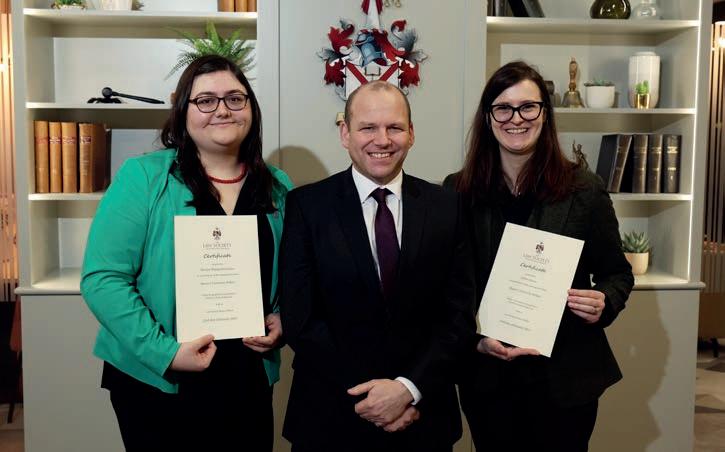
The competition, which has been successfully run by the Law Society over the last number of years, provides law students and trainees with an opportunity to test their client communication and interview skills in scenarios judged by practising and former solicitors.
The theme of this year’s regional heat was Environmental Law and participating teams included:
NEW PARTNERSHIP OFFER FOR LAW SOCIETY MEMBERS
The President of the Law Society of Northern Ireland, Brian Archer, was on hand to join Mark Regan, the Chief Executive of Kingsbridge Healthcare Group, at the launch of a new partnership initiative.

The new initiative will provide members of the solicitor profession with an opportunity to access a series of health and well-being support services provided by the Kingsbridge Membership Club.
Part of the new initiative will include the rollout of a series of events throughout 2023 designed to support solicitors and their staff on several themes.
Commenting on the launch of the new partnership, the President of the Law Society of Northern Ireland, Brian Archer, said:
“The Law Society is delighted to be working in partnership with one of Northern Ireland’s
• Emily McGleenon and Hayley Robinson from the Institute of Professional Legal Studies (IPLS) Siobhan Moss and Jodie O’Reilly from the Ulster University Magee Campus
• Kaitlin McCourt and Ciara McGreevy from the Ulster University Belfast Campus
• Fallon Burns and Dariya-Mariya Petryshyn from Queen’s University Belfast
The winning QUB team will now proceed to the final of the Louis M. Brown and Forrest S. Mosten International Client Consultation Competition which will take place at the University of Maastricht in the Netherlands from 12th to 15th April 2023.
leading healthcare providers to support the health and wellbeing of the solicitor profession in Northern Ireland”.
Mark Regan, Chief Executive of Kingsbridge Private Hospital, said:
“This is an exciting initiative which will benefit the solicitor profession and their staff in accessing professional support facilities and services offered by the Kingsbridge Healthcare Group”.
www.lawsoc-ni.org/new-partnership-offer-for-lawsociety-members
52 Ezine of the LSNI Winter 2022/Spring 2023
Mark Regan, the Chief Executive Kingsbridge Healthcare Group and Brian Archer, President.
Left to right Dariya-Mariya Petryshyn, QUB, Colin Mitchell, Chair judging panel, and Fallon Burns, QUB.
President represents Society at IINI Gala Dinner

The Society’s President, Brian Archer, attended The Insurance Institute of Northern Ireland’s (IINI) Gala Dinner held at the Culloden Hotel and Spa resort.
The President was delighted to meet Leslie Gillanders ACII, IINI President, and to spend time with IINI colleagues.
QUB LAW CLASS OF 1993 RE-UNION FORMAL DINNER 22nd April 2023
Dear Class of ‘93
This year, we will be celebrating 30 years since our graduation together from Queen’s School of Law.
To mark this, and as an excuse for a get together, we are planning a black tie reunion dinner in the Great Hall at Queen’s on Saturday 22nd April 2023.
We will meet at 6.45pm for pre-dinner drinks, followed by a meal and then dancing ‘til late!
Please join us and spread the word! For more information and to book your ticket, please email info1993reunion@gmail.com
Thanks
Andrew Burke and Kerry Hanna
Society
meets memorabilia collector.
Sean, who is a pupil at St Patrick’s High School Keady, is an avid memorabilia collector and had written to the Society about its Coat of Arms.

The Society provided Sean with a tour of Law Society House and presented him with some Society emblems and gifts to add to his growing collection.
Solicitors Financial Services Regulations 2022
The Financial Conduct Authority (FCA) has commenced regulation of the prepaid funeral plan sector under the powers of the Financial Services and Markets Act 2000 (FSMA). The Law Society of Northern Ireland is a Designated Professional Body under Part XX of FSMA.
As a result of same a number of amendments to the Solicitors’ Financial Services Regulations 2018 have been made.
The updated Solicitors’ Financial Services Regulations 2022 can be found here and have been amended at sections 2.2, 7.1 & 7.2.
Should a solicitor in Northern Ireland wish to act as a provider (or a representative of a provider) of a funeral plan contract they should seek authorisation to do so directly from the FCA.
Ezine of the LSNI 53 Winter 2022/Spring 2023
The President, Brian Archer and Chief Executive, David A. Lavery CB were delighted to meet Sean McCourt-Kelly at Law Society House.
For Bookings: Telephone: 028 9622 7437
Email: meetingspace@lawsoc-ni.org
Website: themeetingspaceni.co.uk

















































































